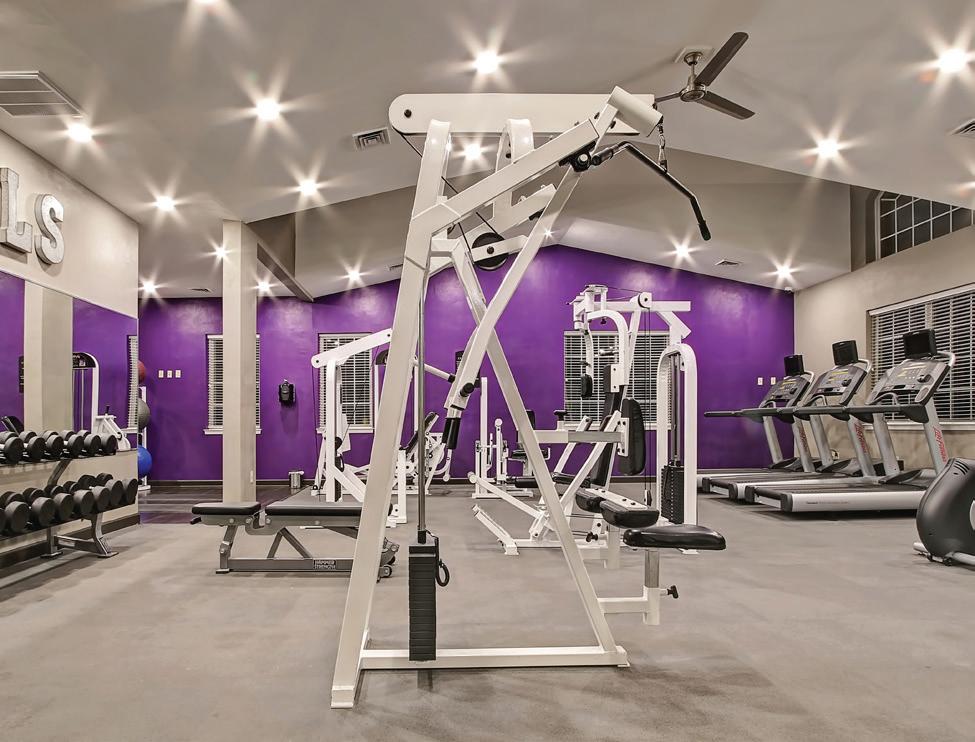Road to recovery: Local resources combat addiction
By BILLY MCKEON contributing writerAfter two suicides on JMU’s campus early in the spring 2022 semester, students gathered on the Quad for a candlelight vigil to mourn the tragic losses in the community. This coincided with a large student outcry for JMU to expand the mental health resources offered to students.
It’s no secret college students nationally are experiencing a mental health crisis. According to the Clay Center for Young Healthy Minds, 73% of college students experience some sort of mental health crisis while they’re a student. The same report also states nearly one-third of college and university students have reported feeling depressive symptoms so severe they had trouble functioning.
According to data from the Texas Medical Association, young adults with mental illness are at a heightened risk of abusing illicit drugs. This is supported by a study published by RehabSpot, in which it reported 37% of college students have reported using illegal drugs or abusing alcohol in the last three years.
It impacts Harrisonburg outside of JMU as well. Harrisonburg Police Chief Kelley Warner started at the Harrisonburg Police Department (HPD) last summer. Since then, she said, there’ve been four opioid overdoses in Harrisonburg, one of which was connected to fentanyl. In the past year, Warner said she’s worked to deploy officers with narcan — a prescription medicine designed to reverse the effects of an opioid overdose — to provide residents immediate medical assistance even before rescue teams arrive on the scene. HPD’s used narcan on the scene eight times, Warner said.
For her, substance abuse “is a big deal to us.” With drug overdose deaths on the rise in the U.S., according to the Centers for Disease Control and Prevention (CDC), psychological and addiction services are necessary to combat the epidemic. Sarah Dunlap, a student at Northwestern University in Boston, lost her brother to a drug overdose when he was 25, according to an article from Inside Higher Ed. She believes if the people around him had called emergency services sooner, his life could’ve been saved.
Dunlap said many students fear facing legal repercussions by disclosing their substance misuse or abuse to a professional. Harrisonburg and JMU have a number of resources available to students and other community members who suffer from substance misuse or abuse.
“I think [legal repercussions are] a huge deterrent [to calling for help],” Dunlap told Inside Higher Ed. “Even with the paraphernalia, which is not a direct charge, a lot of people would have those concerns.
Trainings prep for real-life conversations
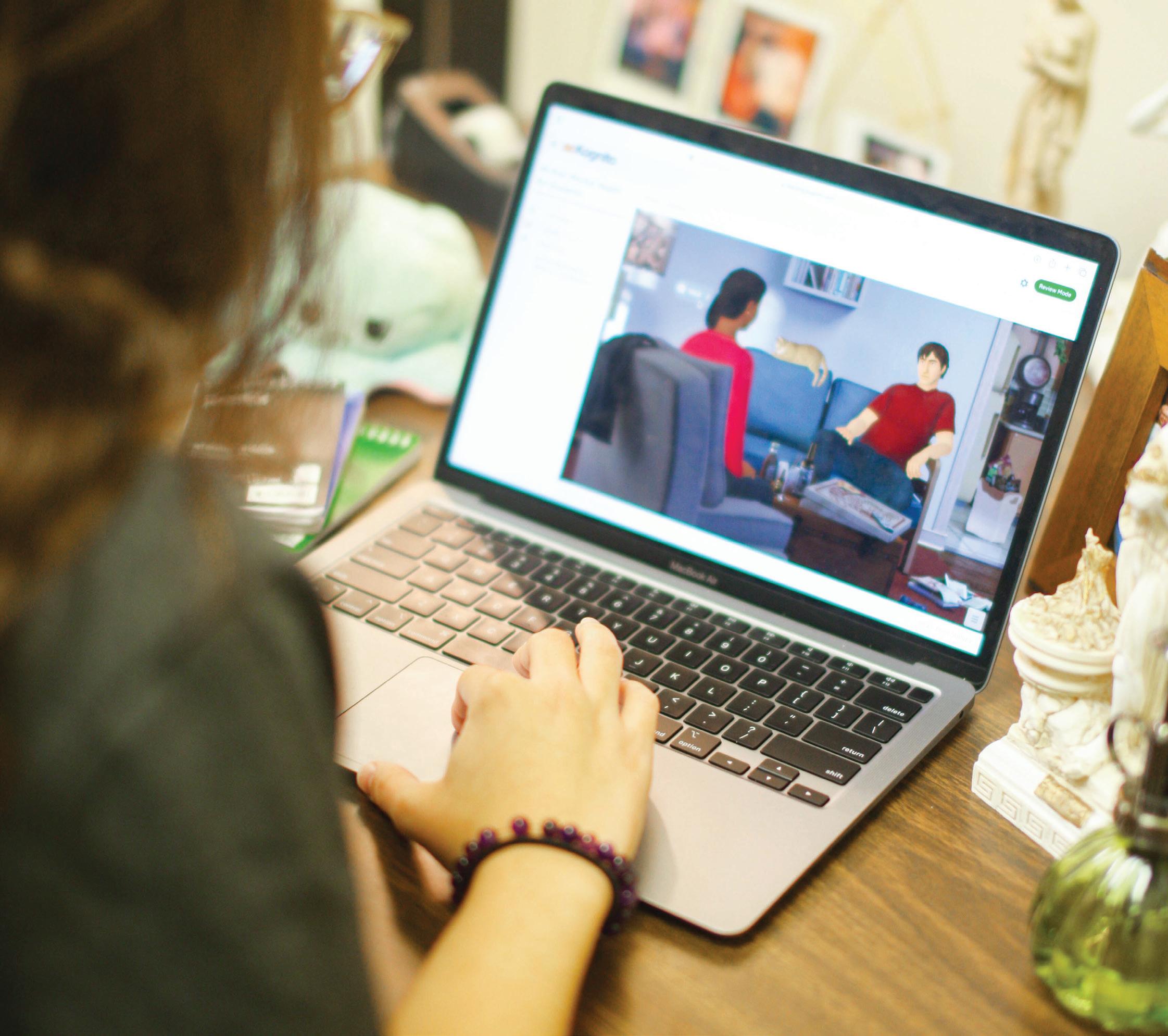 By LIZZIE STONE contributing writer
By LIZZIE STONE contributing writer
JMU required new trainings for students and faculty this year: an at-risk mental health training for everyone and a sexual assault prevention model just for students on how to recognize signs and help each other work through problems related to those topics. The new programs, which were due Oct. 1, are set up through Kognito, a company that builds custom training simulations for a variety of organizations, and are available through the MyServices tab on MyMadison.
Tim Miller, vice president for student affairs, said the modules are an interactive simulation. A digitized character walks students through a conversation they might have with a person dealing with a mental health or sexual misconduct concern. Miller said the model was designed to engage students more than a PowerPoint would.
“It’s really just walking you through what it’s gonna be like to be with a friend who might share
some of this information,” Miller said. “We really want students to build some skills about how to be supportive of their friends.”
When students were placed in the simulated conversations, there were different types of actions to take, freshman Kylie Watkins said. Students could choose from different dialogue options, but the modules also showed alternate strategies for diffusing a situation, she said.
“Most of the stuff I kind of was like, ‘Yeah, I know this already,’ but then being able to have the different choices of direct and distract and delegate was also helpful,” Watkins said. “I’m not a very confrontational person, so having those different options could be helpful in real situations.”
If students didn’t complete the modules by Oct. 1, they’re at risk of a hold being placed on their student account, which would prevent class registration in the spring until removed. However, Miller said his department will work with students to give them time to complete the
modules, and holds won’t be enforced quite yet. Any holds will be removed once both training sessions are completed.
“We’re going to look at the numbers and see where we’re at before we do any holds,” Miller said. “We want to give them enough time because our goal really is to get them the training, not to put a hold on their record.”
JMU faculty had to complete their own Kognito training. Miller said the faculty training modules were simulated conversations between a faculty member and a student, rather than the peerto-peer conversation trainings that students completed. Geography professor Zack Bortolot said the modules were new training for him. The school has given information on similar topics before, he said, but the practice conversations in the simulations were new, focusing more on application by showing real conversations with students, he said.
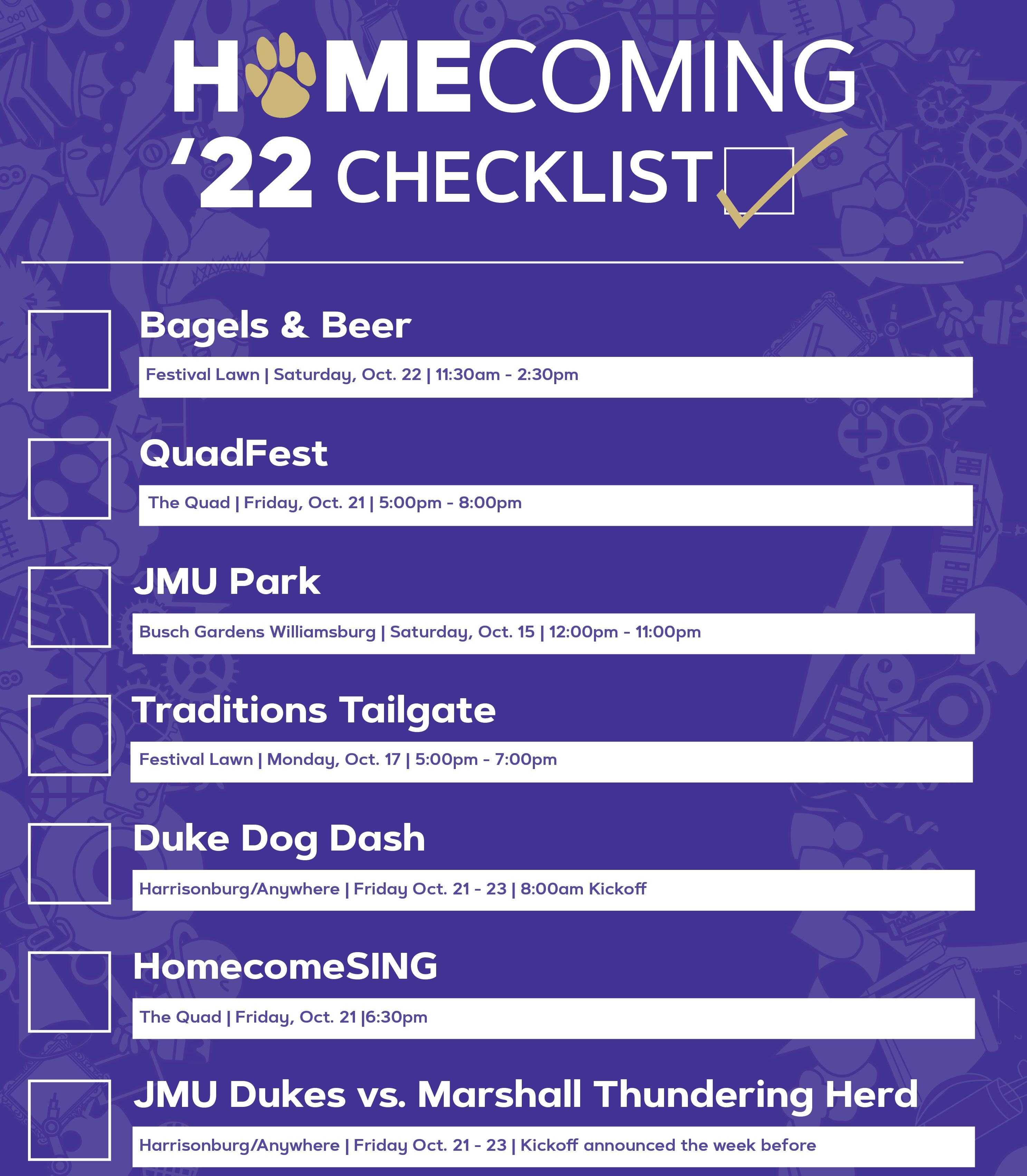
What's inside...
SOCIAL SCENE
THE REASON STUDENTS
TO COLLEGE IS NOT
LOCAL BREWERY
AS COMMUNITY HUB
SPORTS
JMU FANS ENJOY FRESH

AFTER
CHEERS AND BEERSCULTURE 20 NEW PERSPECTIVES
4-0 START
CORRECTIONS: An article about student voting ("Voice your vote," Sept. 29) included quotes from James Madison Center for Civic Engagement graduate assistant Angelina Clapp. The article incorrectly stated their name was Angela Clapp. An article recapping the SGA Senate ("This week's key takeaways from SGA Senate," Sept. 29) incorrectly spelled Judah Acheampong's name. The online articles have been updated to reflect these changes.
Editorial Staff
CHARLOTTE MATHERLY breezeeditor@gmail.com
NEWS EDITOR KASEY TRAPUZZANO breezenews@gmail.com
CULTURE EDITORS MICHAEL RUSSO & AVERY GOODSTINE thebreezeculture@gmail.com
VIDEO EDITOR CHRISTABELL DEMICHELE breezevideo1@gmail.com
EXECUTIVE EDITOR SHIRIN ZIA FAQIRI breezepress@gmail.com
SPORTS EDITORS MADISON HRICIK & GRANT JOHNSON breezesports@gmail.com
OPINION EDITOR EVAN WEAVER breezeopinion@gmail.com
ART DIRECTOR ANNA LEONE thebreezeartdirector@gmail.com
ONLINE MANAGING EDITOR SAVANNAH REGER thebreezeweb@gmail.com
COPY EDITORS EMMA JOHNSON & MADISON MILLS breezecopy@gmail.com
PHOTO EDITOR
ABI MIDDLETON breezephotography@gmail.com
AUDIENCE EDITOR ALI MCCALEB thebreezesocials@gmail.com
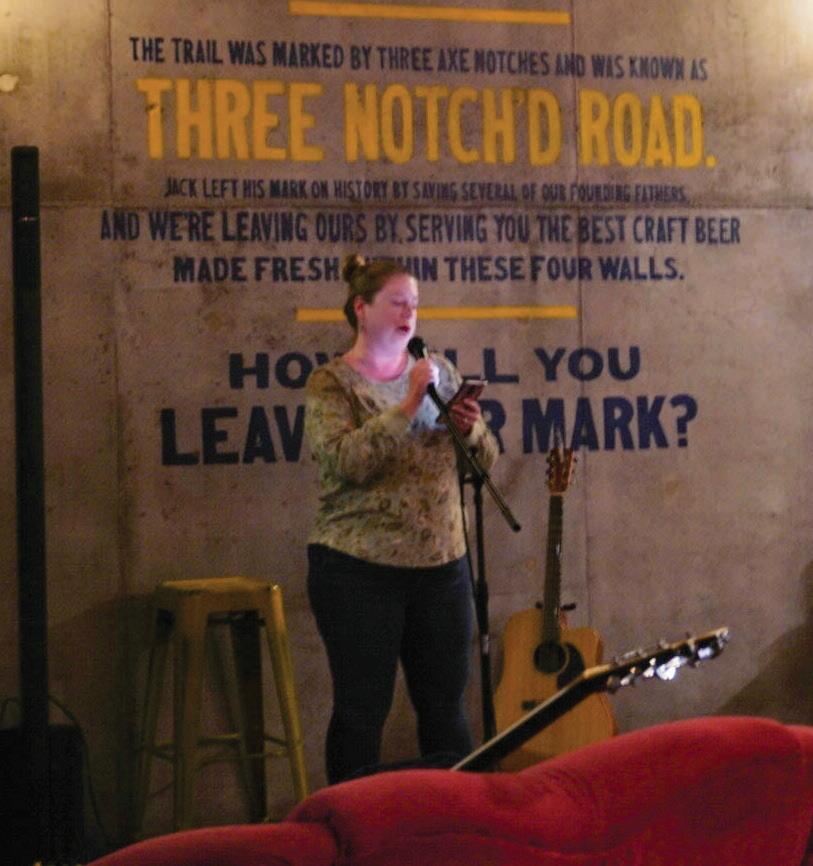
PRINT MANAGING EDITOR
CAMPBELL breezeinvestigations@gmail.com
COVER PHOTO ILLUSTRATION BY: ABI MIDDLETON / THE BREEZE

The Breeze
JMU’S AWARD-WINNING NEWSPAPER SINCE 1922
MISSION
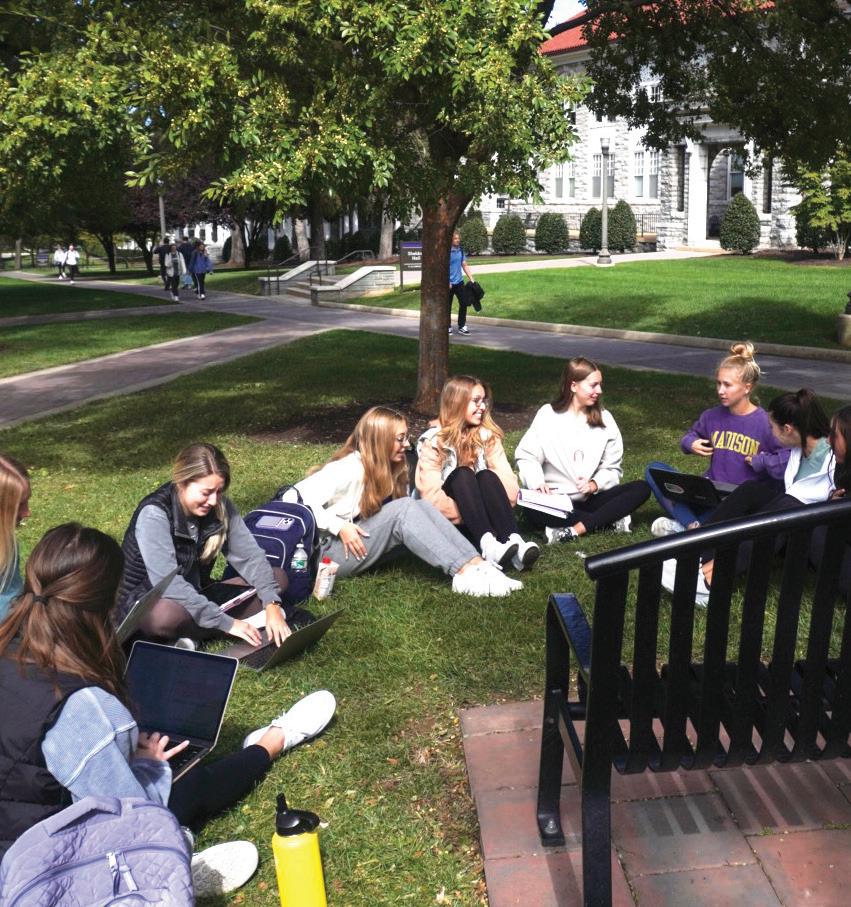
Peer to peer

Students, professors complete training modules to build skills for difficult conversations
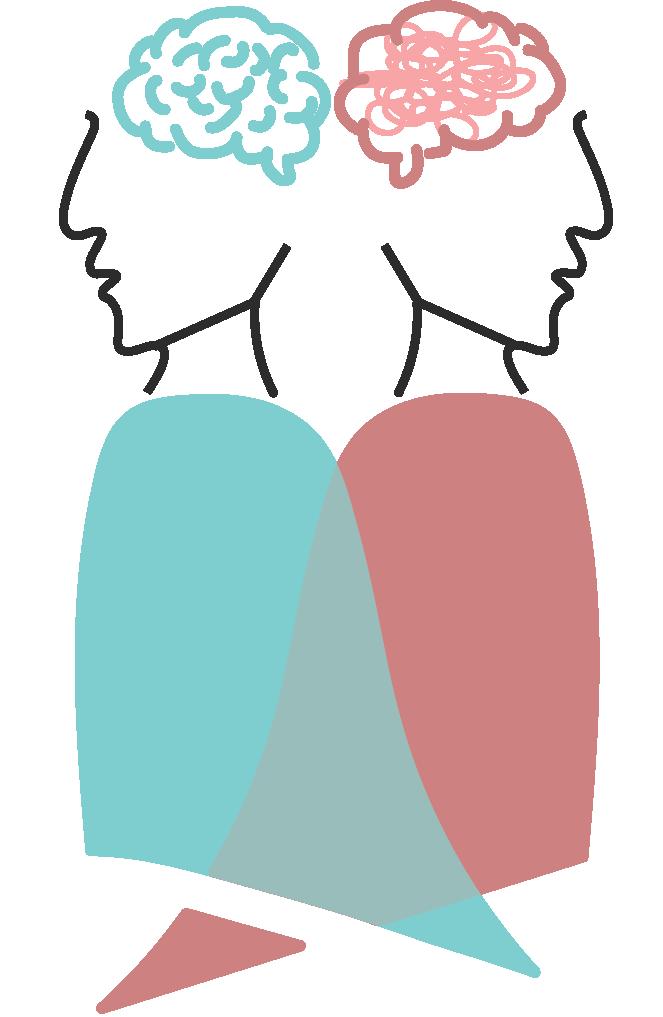
from TRAINING, page 1
“Hopefully, it’ll get people to think more carefully about what they say to students and allow them to better handle stressful situations,” Bortolot said. “Also [it shows how] to go talk to a student who’s doing poorly and think to ask questions about what problems the student is facing outside of school. Hopefully that will prevent more students from dropping out and from having other problems, when you’re able to address it earlier.”
The school has also never done training as interactive as these modules, Miller said — in the past, it’s been mostly videos and questions. The information in the new modules was also guided by student surveys from across the country and is meant to show conversations that are actually possible, Miller said.
“[Kognito is] updating this all the time with the kind of scenarios we’re hearing from students,” Miller said. “So it’s meant to be realistic … as much as a computer avatar can be realistic. These are real scenarios that college students face.”
Sophomore Parker Gnatek, president of the Mental Health Awareness Club at JMU, said the club is largely supportive of the program. He said it was nice to see JMU making an effort toward supporting mental health so early in the semester. Even so, while the modules bring awareness to the problem, Gnatek said, they don’t fix much for students actually dealing with the issues.
“We didn’t have a very good year last year,” Gnatek said. “In terms of mental health, it was a very detrimental year for us. It’s somewhat helpful that they’re kind of stepping it up a little. But I mean, I can’t really say that it’s like a huge improvement.”
Miller said the university has heard mixed opinions on the trainings from both faculty and students.
“I think that the attitude that you bring into the training directly relates to how you feel the training was,” Miller said.
Miller said his goal for the modules is to help students feel prepared if someone comes to them expressing a concern. As a first step, before directing someone to resources like counseling or student services, Miller said students should be comfortable offering support.
“While that person, that counseling center or dean of students is incredibly trained and going to be very thoughtful and caring, they’re a stranger,” Miller said. “They came to you as someone who they know and trust. So we want people to get a little more comfortable sitting in that space with them.”
Gnatek said he appreciates students’ ability to help each other but feels the school itself should play a bigger role in supporting mental health. He worries the modules focus too much on individual students’ responsibility and instead said he believes the school needs to do more.
“I mean really taking it a step further and going beyond just showing some level of interest in the problem, to really making a change. That’s where we’re looking for,” Gnatek said. “We as students have taken a step in this by creating our own club to really advocate for ourselves and for positive mental health. But I think that it would really be a big step for the school to see the administration show them that they care. Because at this point, it just kind of seems like, ‘Yeah, we acknowledge the problem, but we’re not going to be able to do anything about it.’”
Magda Smith, a sophomore Residential Adviser (RA), said it’s important to make mental health information available on a large college campus. It can be hard for struggling students to know what to do, she said.
“I think overall, at JMU, they really make it like a really strong point to talk about mental health,” Smith said. “Just the amount of information that they put out there is literally everywhere. We have so many things that [RAs] put on bulletin boards, we’re always sending messages to kids.”
Over the summer, JMU announced a partnership with TimelyMD, a telehealth company that provides colleges with TimelyCare, an app and platform that offers virtual mental health care. This includes TalkNow, its quick-response helpline, 12 free virtual scheduled counseling sessions and on-demand wellness coaching covering everything from mental health to nutrition and exercise. Students can choose what they want to learn more about and work through it at their own pace.
“I usually do tell [students] about the app because it doesn’t feel very daunting,” Smith said. “It’s kind of like, ‘Oh, I can easily do this.’ But honestly, just having someone to talk to usually settles them down.”
Both Smith and Miller said the most used part of the TimelyCare app so far is the online
counseling services. Miller said the on-demand access to counseling is a big part of its popularity, and over half of the TimelyCare sessions so far this year have been outside of the JMU Counseling Center’s normal 9 a.m. to 5 p.m. hours.
As of mid-September, Miller said more than 1,600 students had signed up for TimelyCare.
“That feels low to me,” Miller said, “until I asked the company and they said we’re well ahead of where a university normally is at this stage.”
Smith said she hopes students will continue to reach out for support on campus when they need it. She said she believes the community at JMU really cares, which is one of the reasons she decided to attend JMU in the first place. And, she feels like she’s grown close enough with her student co-workers that they can feel comfortable asking her for help.
“I would say that mental health is still an issue on this campus a lot,” Smith said. “I mean, that’s just because it is a college campus. Because it is so big, it can feel really isolating sometimes. I think that maybe there’s a lot of mental health crises like here at JMU. But I think all of JMU does a good job in dealing with the ones that actually come forward with it.”
CONTACT Lizzie Stone at stone3em@dukes.jmu.edu. For more coverage of JMU and Harrisonburg news, follow the news desk on Twitter @BreezeNewsJMU.
Brinen’s bike shack
Assistant professor of architectural design awarded 2023 Beck Fellowship
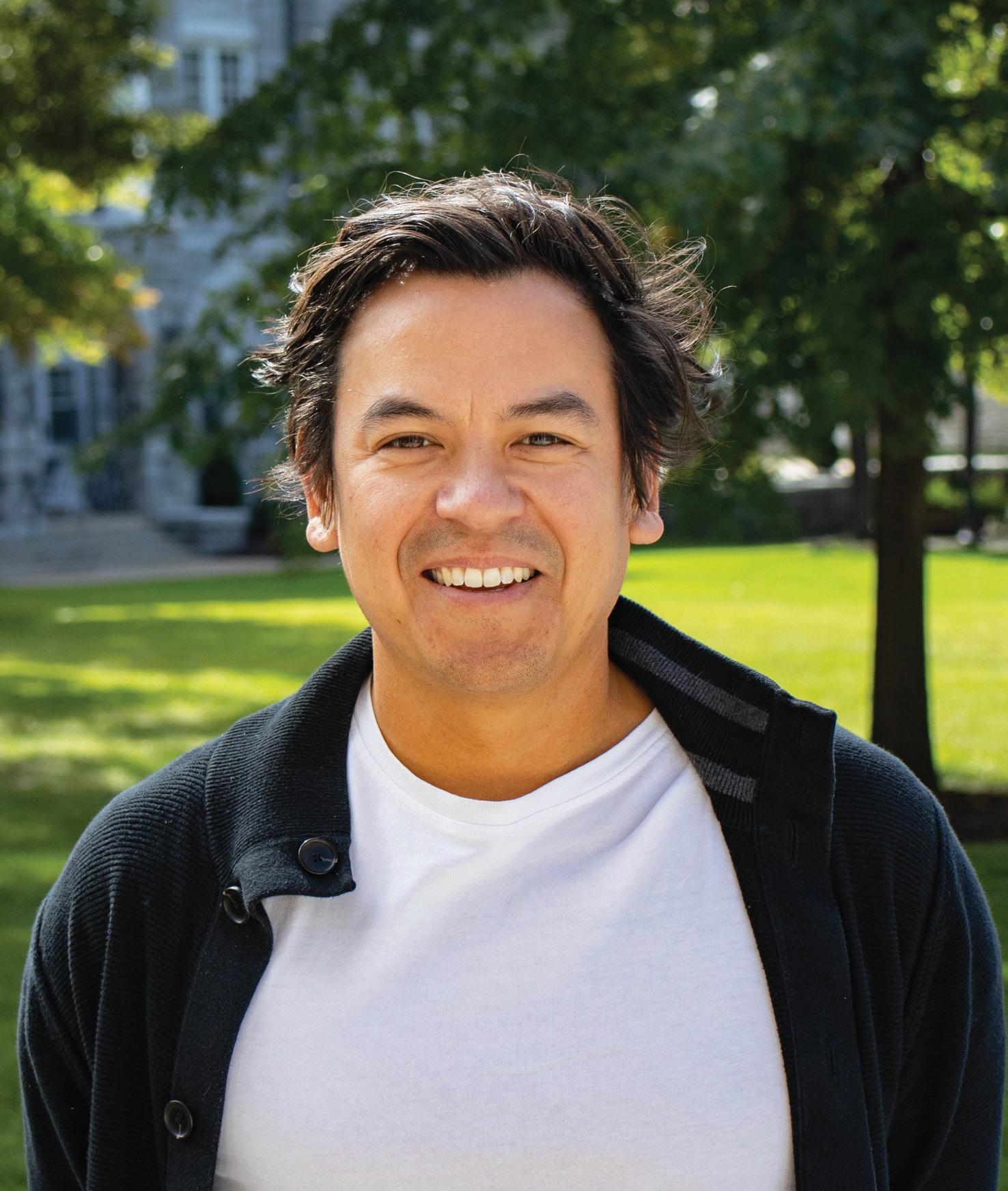 By ASHLEE THOMPSON contributing writer
By ASHLEE THOMPSON contributing writer
Nick Brinen, assistant professor of architectural design, was awarded the 2023 Beck Fellowship from the College of Visual and Performing Arts in September 2022. Brinen received the fellowship due to his spring 2022 project: building a bike pavilion for children with disabilities.
The Beck Fellowship, according to JMU’s website, is an annual $6,000 award to a full-time professor in JMU’s School of Art, Design and Art History (SADAH) who has a vision for the visual arts, works to help the community and uses new technologies, all while keeping students’ success and opportunities to learn at the forefront.
The fellowship is fairly new, starting in 2020, but it has a strong history: Wren River Stevens, the associate dean of the College of Visual Performing Arts, said Christina Updike (’73) — JMU alum and visual resource librarian at JMU for 38 years before retiring in 2012 — and her husband Philip noticed JMU faculty didn’t have many opportunities to receive research funds, so they started to put aside their own money with the idea that one day they’d create a fellowship. Because Updike’s mother, Lillieanna Beck, spent a large part of her life giving Updike an appreciation for the arts, Stevens said the fellowship was named “Beck” in Updike’s mother’s honor.
Stevens said she’s followed Brinen’s work since he started at JMU in 2020 and was highly interested in his studies and desire to help the community.
“Nick is one of our newer faculty,” Stevens said. “When we saw the amount of amazing [projects] that he’s done, it clicked with us. It was no contest.”
The project that got Brinen the fellowship was The Bike Shack. In this spring 2022 project, Brinen said, with the help of his students, he took his skills and experience he learned from teaching at schools such as the University of Virginia

(U.Va.), the Pratt Institute in Brooklyn, New York, and the Rhode Island School of Design to recycle infected wood into a bike storage shed for children in need.

The fellowship was a complete surprise to Brinen, Stevens said, and she wanted to keep it that way up until announcement day. Brinen said learning he was the fellowship recipient felt like being a “scene out of a movie.”
“They were discussing the fellowship,” Brinen said, “and I was waiting with my notebook and pen about how to apply and take notes, and then they said my name. I was sitting in the back and everyone turned and looked at me. I got a little emotional because I had never won anything before.”
The Project
Brinen doesn’t take nature in the Shenandoah Valley for granted. In fact, after reading and learning about the trees in the area, he stumbled upon Harrisonburg Public Works, which offered up wood for people to create something for the community. Brinen reached out and received a vast amount of lumber to use for The Bike Shack.
He then contacted Wendy Schwister, who started a volunteer program in June 2021 at JMU’s Occupational Therapy Clinical Education Services (OTCES) — a teaching and rehabilitation program that helps children regain their motor skills after devastating events like strokes, according to JMU’s website. Brinen noted Schwister as a key figure in his project. For the volunteer project, Schwister collected many old, donated bicycles that she used to start a class teaching children how to fix and tune up the bikes as well as ride them.
Brinen asked if Schwister was in need of a pavilion to house the tables, tools and bikes and offered to build her one, which she immediately agreed to.
Using the treated wood he received from Harrisonburg Public Works, Brinen and 15 of his students in the architectural design department milled and cut the lumber to create a
structure that met Americans with Disabilities Act (ADA) standards.
Shannon Kelliher, a senior architectural design major who helped with The Bike Shack, said the biggest thing she learned from the bike project was how working within the community to benefit it can make a difference.
“[Brinen] really helped guide us through the process of how to build, what to do and how to think of design as a whole,” Kelliher said. “He also left us to our own devices to work together as a group and figure out how to do [the project]. He was there to guide us to make sure the ideas were plausible.”
Brinen already has his next project lined up for the spring. Because of The Bike Shack’s success, other places in the Harrisonburg area have been asking for Brinen’s help.
The Edith J. Carrier Arboretum reached out to Brinen and his department to see if JMU could create something for it. The arboretum suggested the architect department build a StoryWalk, which allows children to learn a story and how to read while simultaneously engaging them in physical activity, Brinen said.
“Trees are coming down, so there is a material stream being directed toward JMU to do something within the community,” Brinen said.
Stevens said she hopes the fellowship will give Brinen and his program the means necessary to keep making a difference in the Harrisonburg area.
“I can speak for all of us in the architecture department when I say we’re super proud of Nick and what he’s accomplished,” Kelliher said. “Hopefully the program will be able to move forward and get bigger and have even more opportunities.”
CONTACT Ashlee Thompson at thomp6ab@dukes.jmu. edu. For more coverage of JMU and Harrisonburg news, follow the news desk on Twitter @BreezeNewsJMU.
Influx of instructors
Grow Your Own program aims to increase education access in low-income communities
By SARAH ECCLESTON The BreezeJoy Myers, executive director of JMU’s Grow Your Own Initiatives, said Mark L’Esperance, dean of the College of Education, saw a problem: There weren’t enough teachers in Virginia schools, especially lower-income schools. In these areas, not only were there not enough teachers, but there also weren’t teachers who reflected the diversity of the students they served.
To work on that issue, Myers said the dean recruited herself and Bryan Zugelder, associate dean for academic affairs and partnerships and an associate professor in the Department of Learning, Technology and Leadership Education, to help create Grow Your Own.
Zugelder said the Grow Your Own program was born to enhance those lower-income schools by awarding scholarships to education students who agree to go back and teach at their local high schools.
The program is fully funded and aims to give back to lowerincome communities by giving people in underserved areas of Virginia an opportunity to become teachers. Over the next two years, JMU will receive a total of $4.2 million from the state for the program, according to a July 27 press release from JMU.
Currently, in-state students admitted for the fall 2023 semester who are planning to major in elementary education, early childhood education or special education and have attended high school in Harrisonburg, Rockingham, Warren, Frederick, Petersburg and Portsmouth districts are eligible to participate in the Grow Your Own program, according to its website.
Myers said the program has two options. Students are either in the campus teaching fellows program, which caters to high school students planning to attend JMU, or the paraprofessional teaching fellows program, which can be pursued either online at JMU or at their local community colleges — Blue Ridge, Laurel Ridge,
Brightpoint and Tidewater community colleges.
According to its website, Grow Your Own offers scholarships and loan awards to recipients of the program, so participants receive full financial assistance for tuition, fees, books and room and board. In return, once the students graduate, they’re required to return to their home districts and teach there for at least two years.
Rachel Kohen, junior early education major, is student-teaching at a local elementary school in Waynesboro, Virginia. Emphasizing the teacher shortage the Grow Your Own program is working to help fix, Kohen said many of the teachers she works with have told her there are too many students in classrooms compared to the number of teachers.
Kohen said a kindergarten class at the school she’s studentteaching at would normally hold around 16 students, but this year, the class has 25 students enrolled — with only one teacher.
“If there isn’t smaller classes there isn’t as much individual help,” Kohen said.

Zugelder created the proposal for funding from Congress.
Zugelder said states have been taking measures to increase the number of teachers. Some states, he said, are allowing individuals who didn’t obtain teaching licenses or college degrees to become teachers. This includes Arizona, where the school board of education is now allowing substitute teachers, some of whom only have a high school diploma, to become full-time teachers for a whole school year, according to a Sept. 13 article from The Washington Post.
“Our experience is lowering standards is not the solution,” Zugelder said. “Keeping the standards high and also providing the supports that are needed so that people can feel like they are successful in the profession … that keeps the standards where they should be, so it helps sustain in the long run.”
Myers works with the 13 on-campus students and 78 offcampus students who are enrolled in the program. She said the program allows JMU to support people who wouldn’t have
become teachers otherwise.
GraphicbyShirin
“Teaching is not an easy profession,” Myers said.
According to its website, both the campus teaching fellows and the paraprofessional teaching fellows in the Grow Your Own program must maintain an overall GPA of at least 2.5 and an in-major GPA of 3.0 to remain in the program.
Throughout the program, campus teaching fellows will take several courses together with other students enrolled in the program, such as EDUC 200: Foundations of Education in the United States and EDUC 310: Teaching in a Diverse Society, according to its website. Additionally, campus teaching fellows must meet in both small and large groups meetings with other students in the program, facilitated by Kristi Peery, the Grow Your Own liaison. Once a semester, campus teaching fellows must also meet oneon-one with Myers to check-in.
Myers and Zugelder worked closely with the school divisions to figure out how to meet their needs, which they applied in the Grow Your Own initiatives.
“It’s a win-win for everyone,” Myers said, “and we are very thankful for the opportunity to provide this important service.”
CONTACT Sarah Eccleston at ecclessk@dukes.jmu. edu. For more coverage of JMU and Harrisonburg news, follow the news desk on Twitter @BreezeNewsJMU.

On-campus adjustments
Largest freshman class shifts residence hall housing
By ELLE HART The BreezeThe class of 2026 is the largest freshman class that JMU has had in over a decade — a record previously held by the class of 2025 last year. This year’s freshman class has 4,874 students, while last year’s freshman class had 4,799 students, according to the State Council for Higher Education in Virginia (SCHEV).
During the Sept. 16 Board of Visitors meeting, JMU President Jonathan Alger said the newest class is far above the target number of 4,650. Many of these students live on campus, which has affected the space allotted to on-campus residents.
On-campus housing is currently at 97% capacity with about 6,450 students living on campus, Dawn Ohanessian, the assistant director of university housing, said in an email to the Breeze.
This past summer, the Office of Residence Life (ORL) made some changes to which buildings were designated as freshman dorms versus upperclassman dorms. Typically, Ohanessian said,
upperclassman dorms are ones that have air conditioning, elevators and non-hall style bathrooms, while that’s not always the case for freshman dorms.
“A big part of our decision as to which buildings will be designated for first year students is the anticipated number of incoming first year students each year,” Ohanessian said.
Logan Hall, one of the residence buildings in the Bluestone area of campus, was originally an upperclassman dorm, Ohanessian said, but due to this year’s large freshman class, Logan Hall was designated as a freshman dorm, while Harper Allen-Lee Hall — another Bluestone area residence hall — became an upperclassman dorm to accommodate those who would’ve been in Logan Hall.
“Because this happened over the summer, we were able to make these changes before anyone moved in and had to physically move to a new building,” Ohanessian said. “We worked with all of the students originally assigned to Logan to reassign them to a different upper class building in the Bluestone area prior to move-in.”
Freshman Finn Benedetti said that when signing up for a dorm in mid-July, his roommate chose their dorm in the Village due to having an earlier time slot. According to the One Book, first-year room selection took place from July 11-22.
“It was the last Village building,” Benedetti said, “or one of the last ones that had [rooms].”
Benedetti said he wanted a dorm in the Village because his father had lived in the Village when he was at JMU, but Benedetti said he wished he’d chosen a dorm with air conditioning.

Sophomore Noah Cha is currently a Resident Advisor (RA) in one of the Skyline residence halls. This is Cha’s second year living on campus; as a freshman, he said, he “didn’t ever have to wait for laundry,” while this year it’s a little different. Another RA, sophomore Isabella Arigoni, agreed.
“There’s always some sort of line [in the laundry room],” Arigoni said.
In contrast, Benedetti said he hasn’t had any issues with lines for laundry, though he said that may be due to the “awkward times” he
chooses to do it.
During RA training, Arigoni said those giving the training barely referenced the fact that this year’s freshman class was so large.
“[Those giving the training] kinda hinted at it. They were like, ‘Since there are so many people this year, we’ve had to open up Treehouse [a group of residence halls within the Lake Area residence halls] to freshmen,’” she said. “That’s really all they said.”
Arigoni said RAs were trained on how to handle roommate disagreements. The first step is to try and help them get along because Arigoni said a room change isn’t always possible.
“There’s a little bit less options to change rooms,” Cha said, “cause there’s more people.”
On average, 35% to 40% of sophomores sign housing contracts through Live On Again, JMU’s program for upperclassmen living on campus. Ohanessian said ORL anticipates there’ll still be enough room for both the next freshman class and next year’s returning upperclassmen.
“The only caveat may be that as we move into the spring semester,” Ohanessian said, “we may need to let upper class students know that they will need to make a decision about living on campus earlier than usual, in case we do need to close upper class contracts for the following year.”
In the coming years, JMU plans on renovating several major areas and buildings on campus, including Carrier Library, which will close in May 2023, until fall 2026, a makeover for the Convocation Center that’ll include a volleyball arena, indoor track, team offices and new locker rooms, as well as the renovations of Village dorms.
At the Sept. 16 Board of Visitors meeting, Alger said the Village will be renovated one building at a time because JMU can’t take all the beds “offline” at once. The renovation will start with Ikenberry Hall, which will be replaced with a 500-bed facility.
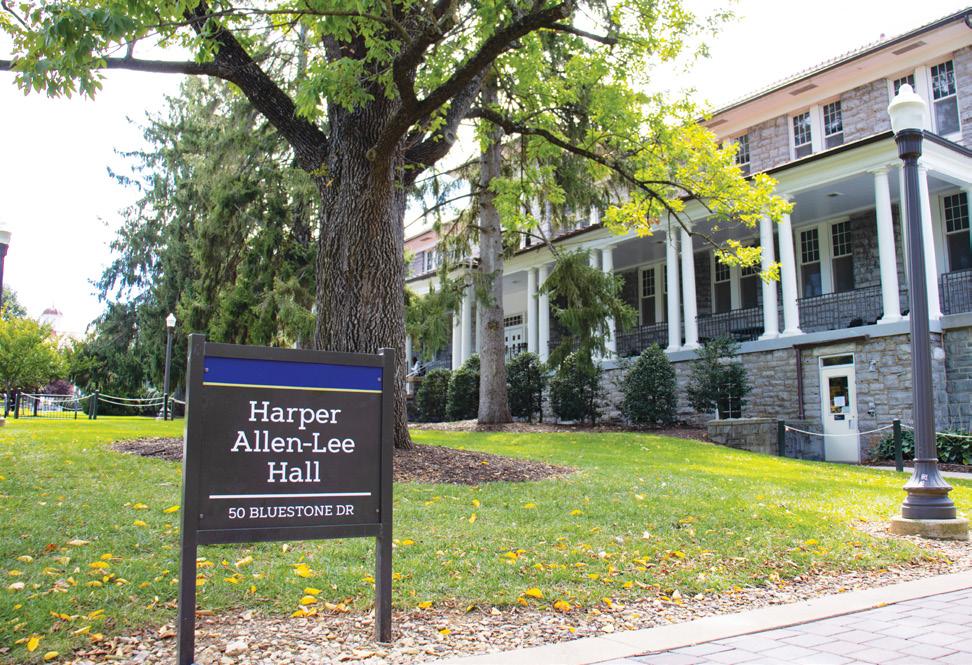
CONTACT Elle Hart at hart2ej@dukes.jmu.edu. For more coverage of JMU and Harrisonburg news, follow the news desk on Twitter @BreezeNewsJMU.
CHICKEN SANDWICH™ COMBO


This week's key takeaways from SGA Senate
 By ASHLEE THOMPSON contributing writer
By ASHLEE THOMPSON contributing writer
The Student Government Association (SGA) Senate passed the University Program Board’s (UPB) requests to purchase a new popcorn machine and a new step-and-repeat backdrop for events at Tuesday’s meeting.
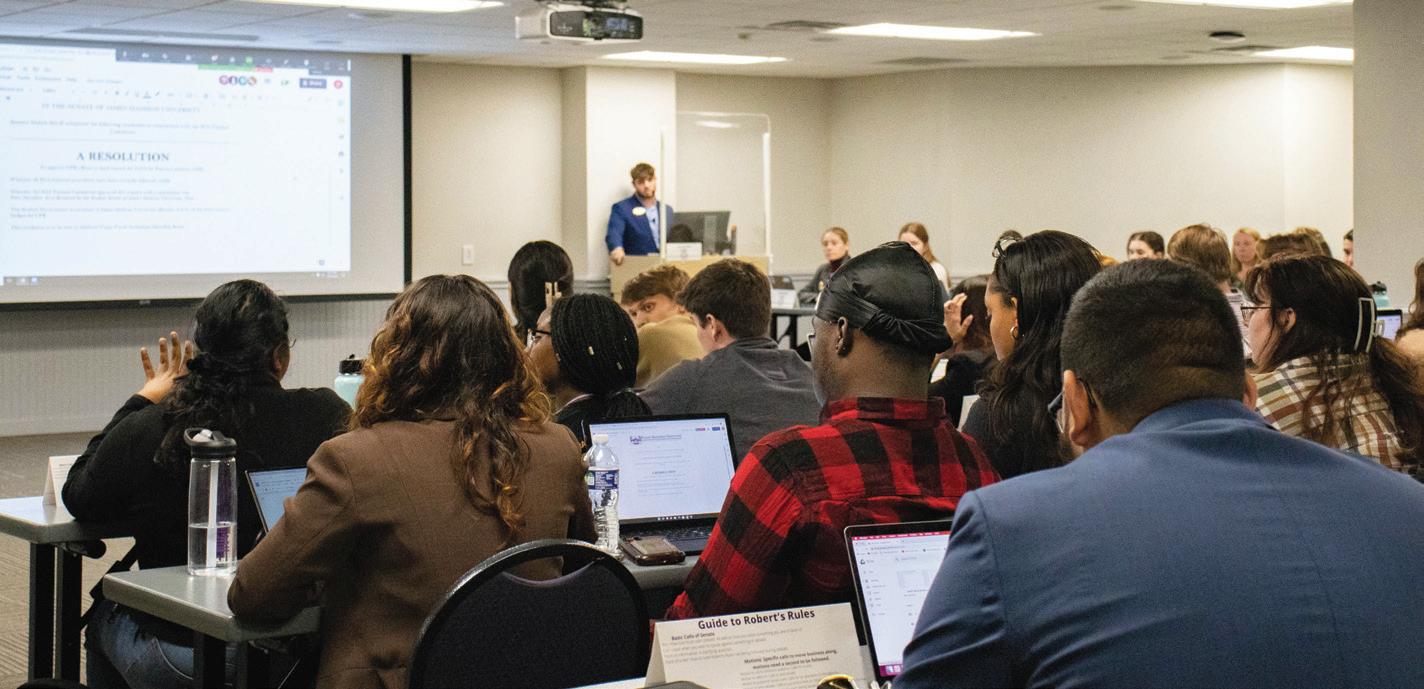
UPB is a front-end budgeting (FEB) group within SGA: an organization whose mission is seen as crucial to the university, according to SGA’s website. FEB groups get prioritized frontend budgeting to ensure funds for their needs instead of having to fundraise themselves. All FEB groups are funded by student fees, and budgets vary from $3,000 to over $100,000, with allocations based on an organization’s needs and amount approved by SGA, according to SGA’s website.
Junior Nina You, vice president of administration and finance of UPB, and senior Kelly Jorgensen, president of UPB, presented to SGA regarding the need for new supplies.
You and Jorgensen explained that UPB is in need of a new popcorn machine due to the old machine having a plug that’ll only fit into one outlet on campus. The main drawback of the out-of-date popcorn machine, You said, is that only Grafton-Stovall Theater has the outlet that runs the machine, which makes it inconvenient to host movies elsewhere, such as at UREC, because they’re unable to serve popcorn.
You also emphasized the volume of students this request affects — an approximate 1,500.
“We have about 30 movies played at JMU each year,” You said, “and about 50 students come to each movie.”

Other cons You and Jorgensen mentioned
were the machine’s age and that it’s heavy and hard to “lug around.”
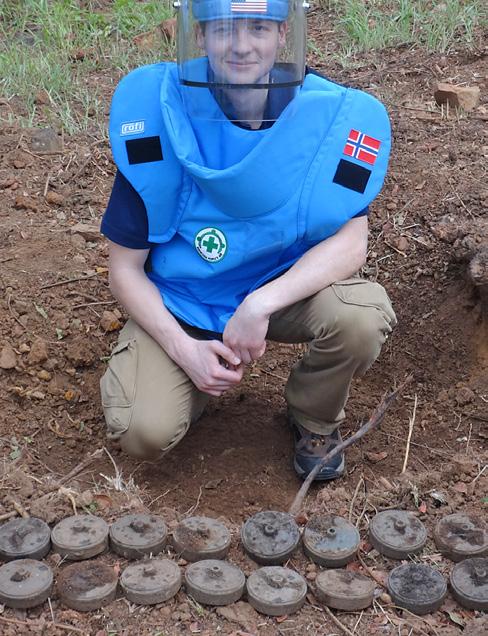
The new popcorn machine will cost approximately $1,175.80, according to the presentation.
The other requested item was a step-andrepeat: a pop-up backdrop at events used for promotion, typically housing a logo. The UPB presenters said their current step-and-repeat has UPB’s old logo on it, which is “counterintuitive,” You said.
Along with the drawback of having UPB’s old logo on it, UPB’s current step-and-repeat is hard to set up, You and Jorgen said said during their presentation. The new step-and-repeat will cost approximately $695, not including shipping.

Sophomore class president Kathryn Manico asked You and Jorgensen if other organizations would be able to use the popcorn machine if purchased, which junior SGA parliamentarian Tara Snowden called “circumstantial” due to the fact that UPB hasn’t had to deal with that issue yet.
“It can be up to the organization at UPB,” Snowden said. “If it comes up, [UPB] can deal with it then.”
During the resolution debate, Mahek Shroff, sophomore finance liaison, said UPB’s request should be approved because “they organize a lot of events” and would be helpful.
After a motion for approval, junior Daniel Gaffin, speaker of the student Senate, approved UPB’s request.
CONTACT Ashlee Thompson at thomp6ab@ dukes.jmu.edu. For more coverage of JMU and Harrisonburg news, follow the news desk on Twitter @BreezeNewsJMU.

U.S. DEPARTMENT of STATE F rasure -K ruzel -D rew M e M orial F ellowship

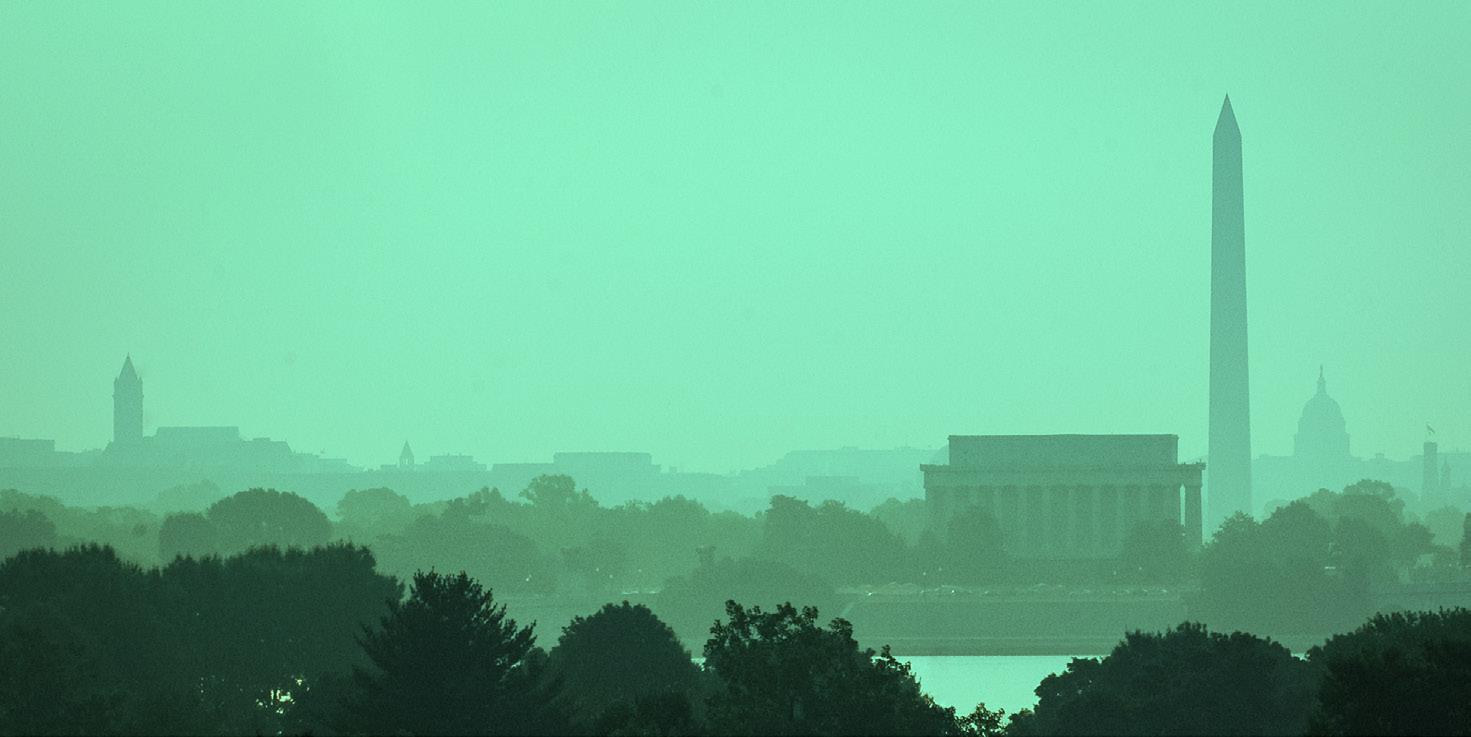
Pursue a career in international security, foreign affairs, or humanitarian assistance by assisting the U.S. Conventional Weapons Destruction program
Oversharing online
A “really, JMU?” dart to to Alumni Relations for scheduling a Bagels & Beer event starting at 11:30 a.m. during Homecoming.
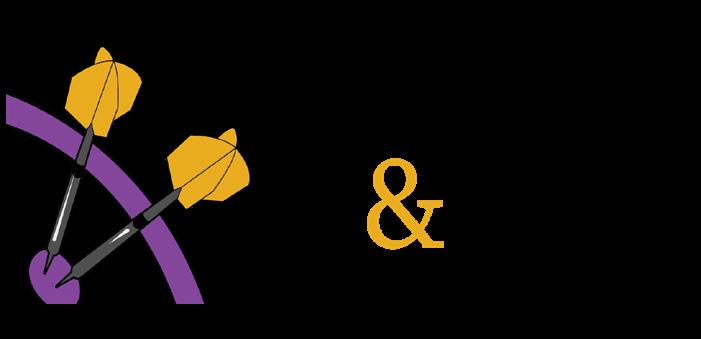
From someone who realizes JMU is a school with a documented drinking problem.
A “sympathy” pat to my professor for letting me take a test online when I was sick.
From someone who didn’t want to get out of bed.
Students should be careful of what they put on the internet
ETHAN JARDINES contributing columnist

There’s a lot of personal information floating around on the internet. In fact, there’s so much information the problem is sorting through it all. Students and faculty alike need to know what personal information regarding them can be found and be wary of what they put online.
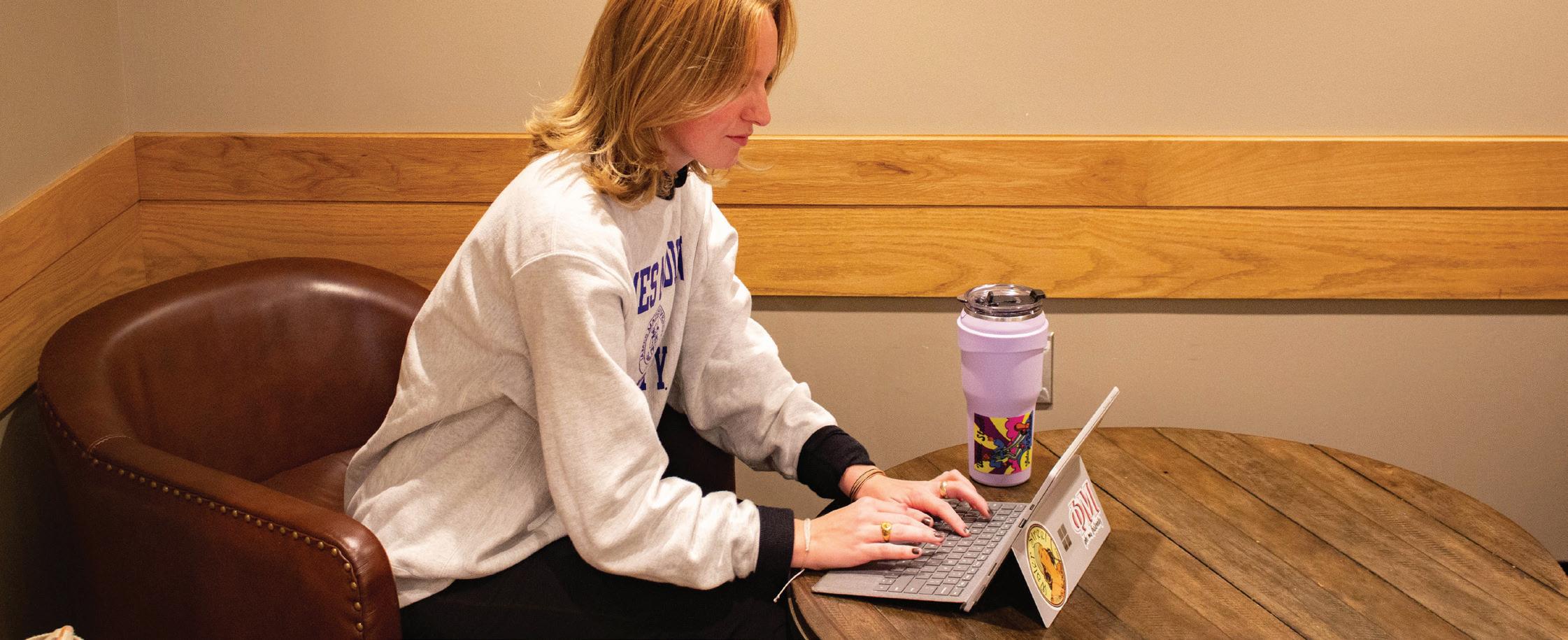
A “piece-of-cake” pat to my minimal course load this semester.
From an experienced course scheduler.
Open-Source Intelligence (OSINT) is information that is openly available to the public. Information gained from newspapers, books, graffiti, television and the material made available to you with a simple Google search are all examples of OSINT. The main focus of OSINT collection is sorting through the plethora of information made accessible by the internet, including social media. We can look to the conflict in Ukraine as an example of this.
Students and faculty need to be aware of the abundance of personal information that someone with access to the internet can take advantage of. Numerous tools have been created that access databases and scour the internet for personal identification. Using some of these tools, bad actors can obtain personally identifiable information (PII) to aid in illegal activities, like identity theft, stalking and extortion.
What’s more concerning, however, is how much PII we introduce to the internet ourselves, specifically through social media. Sometimes, we don’t even know we’ve done it; something as little as a room number or mailbox in the back of one of our photos could give bad actors enough information to determine our place of residence. It’s important to limit how much PII we’re putting out for anybody to see.
the internet, it never truly goes away.
According to a poll conducted by Kaplan Test Prep, 36% of college admissions officers look at applicants’ social media accounts. On top of this, The Harris Poll found that 71% of hiring managers agree that viewing social media profiles is an appropriate way to screen candidates. Think about how far back your social media presence goes — you might be a little nervous about what could be viewed.
Back in 2018, Arizona Cardinals quarterback Kyler Murray won the Heisman Trophy with Oklahoma. On the night he received his trophy, offensive tweets from when he was 15 were dug up, as reported by USA Today. Murray later deleted and apologized for the tweets. These messages were six years old, but it’s not like someone had to hack his account to see these tweets — this was OSINT.

A “happy-birthday” pat to my roommate who turns 21 this weekend.
From someone who is excited to party.
In August, a Russian citizen posted a photo of himself in front of Russian S-400 Air Defense Systems while on vacation in Crimea. The post was geotagged, giving Ukrainian intelligence the location of this station. According to Newsweek, the base was later struck with at least 12 explosions.
OSINT doesn’t just have military and governmental applications. Recently, people have been picking up OSINT as a hobby, participating in challenges and games to find information hidden in dark corners of the internet. More than this, we use OSINT in our daily lives — every time you find sources for an assignment, every time you stalk someone on their social media accounts and every time you read an article in a newspaper, that’s OSINT.
“Don’t give any information like that out,” Janna Parker, a marketing professor at JMU, said. Parker has expertise in social media marketing and advocates for the usage of social media in a professional manner, even going as far as to say everybody should have a LinkedIn account. Parker said students and faculty who use public accounts can protect themselves, but it might be difficult.
“It’s really impossible to do much other than try to limit the personal information you put out,” Parker said.
Beyond malicious uses of OSINT, students and faculty should limit the information they put out on their social media sites because colleges and businesses have started to take a more in-depth look at applicants’ online presences. Once you put something out on
The
The
Before you post something, think about how it reflects on you as a person or what a malicious person could do with this information. On top of this, don’t make it easy for bad actors to take advantage of you. Having a public account just to share with friends is unnecessarily indiscreet; make the personal private, and professional public. There are people who’ll eat your personal information like breakfast, with your reputation or livelihood coming out the other side worse for wear. Sometimes, protecting yourself is as easy as googling your own name — you might be surprised as to how much you can find
CONTACT Ethan Jardines at jardineg@ dukes.jmu.edu. For more editorials regarding the JMU and Harrisonburg communities, follow the opinion desk on Instagram and Twitter @Breeze_Opinion.
Letters and guest columns
Want to praise someone or get something off your chest? Darts & Pats is the place to do it. Submit your own at breezejmu.org.
More than a Degree
The value of college is more than academic success
MARY MABRY contributing columnistNo matter how long you’ve been at JMU, you’ve most likely had to answer the question, “Why are you here?” at least once.
An answer that often comes to mind is “to get an education” or “to earn a degree.”
The Breeze asked three JMU students: “Why are you here?”
Bridget Kimball, a freshman, said she came for an education and a bachelor’s degree in computer science.
Sophomore Rachel Wall said, “I love to learn and I want a job that requires a college degree.”
Grace Dudley, also a freshman, said she’s at college “to pursue my passions and reach my career goals.”
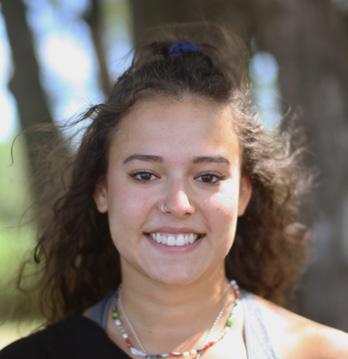
Although obtaining a degree is the outcome of college, academic success isn’t the sole reason students take part in higher education.
To start, college is expensive. Students don’t pay thousands of dollars to achieve academic success. If earning a degree is truly the reason most students go to college, then community college would be the most popular form of higher education.
According to College Board, community college is much cheaper than four-year universities. But it doesn’t offer the typical college experience.
At a four-year institution, students aren’t just paying for an education, they’re paying for an experience: an opportunity to grow, discover their passions, deepen their understanding of the world, meet new people and more.
To apply academic success to these reasons is unhelpful. Discovering one’s passions might take failing a few math classes. Meeting new people might mean staying out late and sleeping through a test the next morning. This doesn’t mean a student is unsuccessful in college.
The reason students come to college shouldn’t be limited to a GPA or grades on a transcript. Everything that positively impacts someone’s college experience should be valued — a reason worth thousands of dollars.
College is hard. When facing burnout, exhaustion and loneliness, academic success isn’t what keeps students at college. In fact, it’s a harmful mindset.
Freshman Katie Runkle said the reason she’s at college is “to develop individually and academically,” but she still has a lot of time ahead
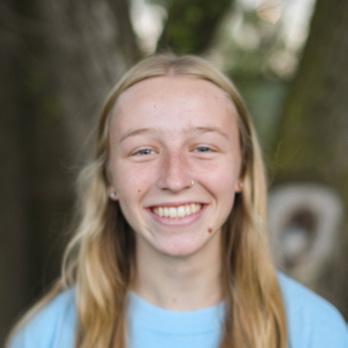
of her and doesn’t think that reason is sustainable.
“I don’t think this reason would be enough,” Runkle said. “It could start this way, but deeper roots would be needed eventually.”
Because college communities cultivate a mindset that idolizes academic success, students believe their value is determined by grades. According to the Center for Communication, the more value students place on their academic achievements, the more it negatively impacts their mental health.
When facing hardship or failure, the pressure of academic success will cause students to doubt their worth. They also might prioritize reaching this status at the expense of their physical and mental health.
Students must discover what makes college worth it for them — especially through the hard parts.
College can prepare students to enter the real world, but students don’t have to be successful in one particular way to take advantage of this. Part of preparing for the real world is failing, problem solving and learning to work well with others. The hard parts of college are what truly prepare students for the real world — not just academic success.
So, maybe success is the reason students go to college, but it’s not academic. Everyone should have their own definition of success; by having a cookiecutter definition of it, students will feel pressured to have the outcome of their college experience — or even their semester — look a certain way.
Professors could focus on their students as people and how they can apply what they learn in class to the real world, instead of focusing on their students’ academic performance.
Student organizations could focus on building genuine, personal connections and create opportunities for students to support one another,instead of being a way to build a resume.
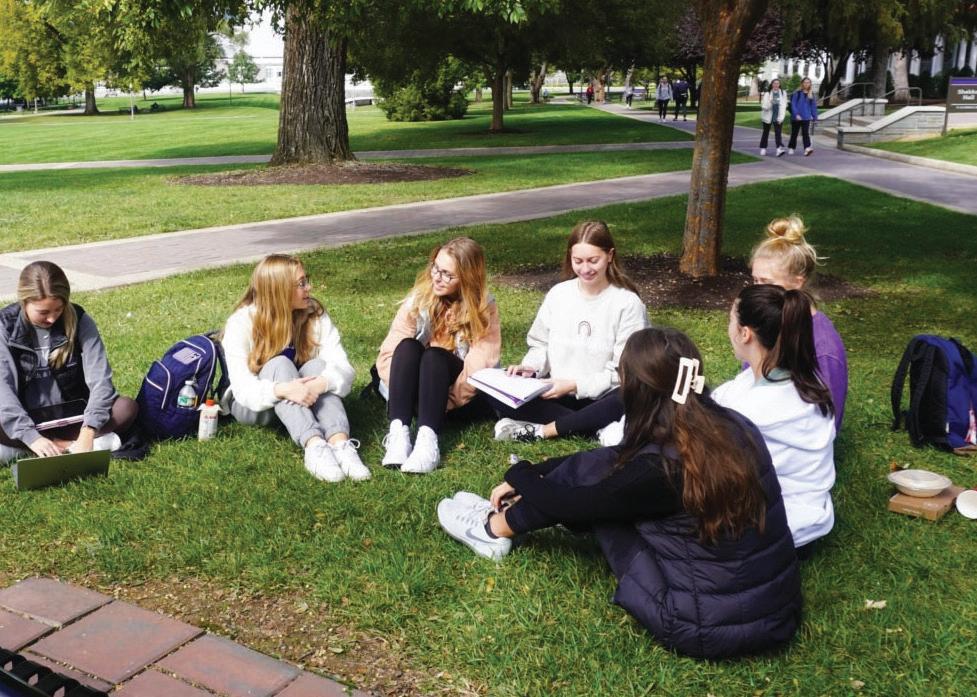
Students should contemplate the real reasons they’re here before answering the question “why are you here?” with “to get a degree.” Doing this can make their college journey more fulfilling and impactful.
CONTACT Mary Mabry at mabrymm@dukes. jmu.edu. For more editorials regarding the JMU and Harrisonburg communities, follow the opinion desk on Instagram and Twitter @ Breeze_Opinion.
Poor politics
Current politicians have set a poor example for a rising generation of voters
ORIANA LUKAS opinions with oriana
“Too much of what is happening in our country is not normal.”
President Joe Biden made this statement on Sept. 1, 2022, while addressing the nation about dangers to democracy that former president Donald Trump’s followers — or “MAGA Republicans,” in line with Trump’s slogan to “Make America Great Again” — pose.
He continued: “Donald Trump and the MAGA Republicans represent an extremism that threatens the very foundation of our republic.”
Whether you agree with this statement or not, it’s undoubtedly a public attack toward a certain demographic. Throughout the speech, Biden talks of unity while simultaneously slandering the opposition, doing the exact opposite of the speech’s supposed intention.
Animosity between opposing parties is inevitable — their beliefs don’t align. Though, the events that have occured within the previous two presidencies, such as threats against bureaucrats, plotting to kidnap the governor of Michigan and the attack on the U.S. Capitol — all mentioned by the Journal
of Democracy as part of increased political violence — should raise alarm to American society. The leaders of the country are currently influencing hateful behavior, and it isn’t just causing verbal dispute between the parties: It’s riots, vandalism, death threats and actual deaths.
It was clear when Trump campaigned in 2016 that the divide between the two parties expanded. Throughout his presidency, this issue only progressed, with each party making hateful remarks about the other. While Trump had the authority to minimize this hate as a figure of influence, he only exacerbated it by making outrageous remarks about the Democratic party and its members. An example of this, according to The Washington Post, was in 2019 when he claimed that four Democrat lawmakers, all of whom were people of color, should leave the country. He said they should “go back” to “the crime infested places from which they came,” according to The Post.

POLARIZATION,
The article continues: He then backed up this claim by stating he doesn’t care if what he said was offensive because people agreed with him. Comments like this continued throughout Trump’s presidency as he took advantage of his social media platforms to spread negativity. This perpetuated the hate within his following and the Democratic party. Once elections came about again in 2020, the tension only heightened between the parties and within society, as demonstrated by the Capitol attack Jan. 6, 2021.
For our generation, this polarization is terrifying and needs to be acknowledged. Politics are relevant in students’ lives and it’s important for students to be able to debate with each other about their stances without feeling hatred toward the other party or fearing that sharing their beliefs will cause backlash.
Jack Levy, a junior at JMU, said he’s often afraid to share his right-wing views as he’s received criticism from both students and teachers at the university.
“I don’t feel comfortable speaking up as I have experienced a few teachers making comments towards my opinion and students coming at me saying stuff over social media,” Levy said. “Once I shared my opinion with a teacher and they stated that they respected my opinion but that it is wrong.”

This polarization is everywhere, and U.S. leaders are setting an awful precedent for young and impressionable minds that it’s OK to judge someone based on their political stance.
Junior Rachel Gordon said she’s a Democrat now, but she grew up with conservative and
religious perspectives. She said the ability to see different points of view is beneficial.
“I think it’s important to understand both sides, and I think it’s a problem that people are so stuck in their ways,” Gordon said. “It’s frustrating having a conversation when the other person knows that they won’t change their viewpoint or even listen to the opposing side.”
The ability to communicate civilly is something our society has lost. According to CNN, on Sept. 18, a man was charged with felony vehicular homicide after saying he hit someone with his car because of a political dispute. He claimed he felt threatened because the person was “part of a Republican extremist group,” according to the article from CNN. What could’ve been a sophisticated conversation instead ended in a tragic death.
In the grand scheme of things, the leaders of the U.S. have the most responsibility in maintaining democracy. They should refrain from perpetuating negative dialogues and encourage the country to come together. Sadly, most are neglecting this power, so responsibility falls to the citizens to try and establish civility. Gordon shared various ways students and young adults can refute this negativity.
“I think it’s important for people to view both sides, be aware how the algorithm is catering to each side, see politicians for who they are, watch out for fake news and most importantly, listen to both sides,” Gordon said.




CONTACT Oriana Lukas at lukasok@dukes. jmu.edu. For more editorials regarding the JMU and Harrisonburg communities, follow the opinion desk on Instagram and Twitter @Breeze_Opinion.


Breeze
DUKES WIN e Breeze

This week in JMU history...
On Dec. 2, 1922,
The Breeze was born. Since then, it’s been the indispensable source of news for the JMU and Harrisonburg communities for almost 100 years. The Breeze will celebrate its centennial this December, so we’re traveling back in time.
Each week, The Breeze takes a look back on historic moments in JMU and Breeze history by publishing the cover from the same publication day, just years in the past.
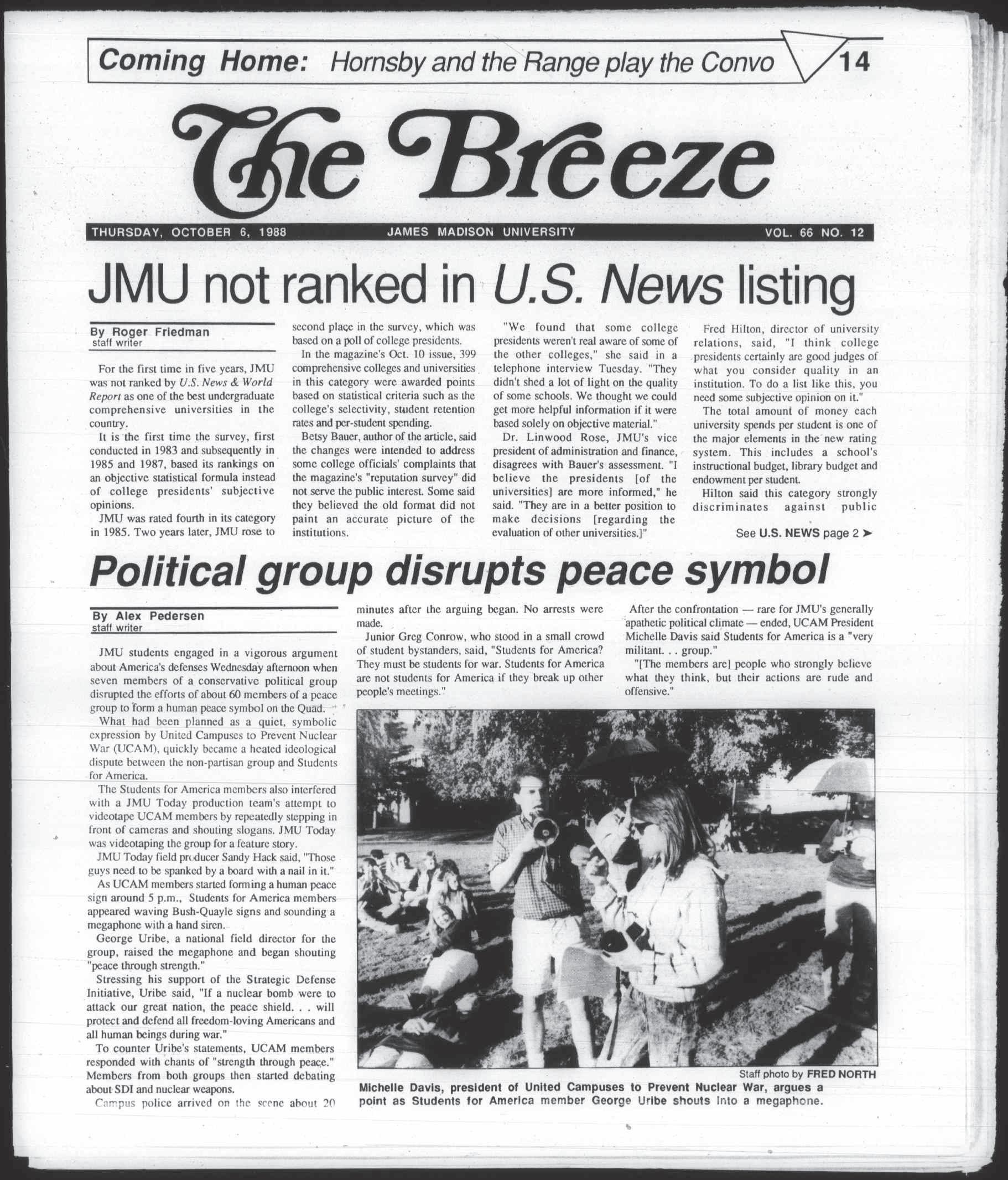
Break the stigma
University and city resources confront substance abuse and misuse
from SUBSTANCE MISUSE, page 1
On-campus resources
Every JMU student is required to take HTH 100: Personal Wellness as part of their General Education course requirements. In this course, students examine the different dimensions of health and wellness and how to incorporate healthy practices into their lives.
Health sciences professor Chris Smith currently teaches two sections of the class after recently taking on a lecturer position in addition to his role as a certified athletic trainer at the university. Smith describes the curriculum as aiming to give students “an overarching view on all aspects of health.”
The HTH 100 curriculum dedicates a unit to substance abuse but doesn’t “take as deep of a dive” as other classes, Smith said.
One way Smith has taught students to develop a healthy relationship with alcohol is by having students attempt to pour one serving — represented with water in the class — into a red solo cup. Smith said many students don’t realize they almost always pour more than one serving into the cup.
Smith said he’d like to see JMU’s Counseling Center visit HTH 100 classrooms more often and directly tell students about the resources available to them. He said many students look off campus when seeking substance misuse or abuse treatment and it’s important for them to understand there are “robust resources available to them right on campus.”
According to JMU’s website, students can walk into the Counseling Center, located on the third floor of the Student Success Center, for a free appointment with a professional counselor any time between 10 a.m. and 3 p.m. Monday through Friday.
During this first appointment, students can choose to have an anonymous conversation about their alcohol and/or cannabis use. According to the Counseling Center’s website, these consultations take between 45 minutes and one hour. During the consultation, students can create expectations with their counselor for how they’d like to incorporate substances into their lives, learn about potential risks and identify what’ll help motivate them to achieve their goal.
Another resource available to students is the wellness coaching at the University Recreation Center (UREC). In a wellness coaching session, students sit down with a coach and explore the role substances play in their lives.
Sonia Doulamis, the assistant director for substance misuse prevention at UREC, helps conduct these coaching sessions. She said this program’s available for any student who thinks they might be suffering from any form of substance misuse or abuse, including
marijuana, alcohol, nicotine and more.
In a student’s first meeting, they’ll be introduced to the program and will be guided in an open conversation about the role substances play in their lives. Doulamis said students sometimes realize for the first time during these meetings that a certain substance is negatively impacting them.

After two weeks of meeting, UREC will usually refer the student to a specific treatment center, on or off campus, so they can receive further treatment. The meetings at UREC are all free, confidential and don’t force students to stop using substances if they don’t want to. Students meet with the coach as many times as necessary for the coach to give a proper referral.
“[Our treatment is] fair, equal, free and non-judgmental,” Doulamis said. “We want to empower students to make the best decision for themselves.”
Doulamis also said there’s a way to use substances “in a low-risk way” so students can still live a healthy and productive life.
This issue isn’t specific to JMU, Doulamis said — students can often face difficulties when trying to safely partake in or avoid substances, and there’s a stigma around seeking help. She said changing the conversation around substance use will take effort from everyone.
“Respect is something we all can work on,” Doulamis said. “Culture starts with students.”
Community resources
Harrisonburg’s also home to multiple local affordable options for care, including The HarrisonburgRockingham Community Service Board (HRCSB), which provides free healthcare to the community, including mental health, substance abuse and developmental disability services.
HRCSB’s walk-in hours extend from 8 a.m. to 2:30 p.m. on Mondays, Wednesdays and Fridays, and intake appointments generally take about two hours, according to the website. An insurance card, proof of residency, a social security card and
photo ID are requested at the appointment, however, anyone can still receive treatment without these documents and shouldn’t be discouraged from making an appointment if they lack one of them, according to the HRCSB website.
The Valley Community Service Board (VCSB), a publicly funded organization created in 1971, and provides a variety of public resources to the local community. The VCSB recently launched the Begin With Hope initiative, a campaign aimed at preventing substance misuse and addiction and spreading awareness about available resources. The VCSB Office Based Addiction Treatment program is free and available to anyone in the Harrisonburg community. These resources include a confidential consultation and medical recommendation from a licensed doctor.
Jeffery Robbins, a nurse practitioner and medication assisted treatment prescriber for the VCSB, meets with individuals seeking services, makes medical recommendations to help foster their recovery and determines which stage of recovery a patient is currently undergoing.
Robbins identified six stages of recovery: precontemplation, contemplation, preparation, action, maintenance and termination.
The precontemplation stage determines whether substances play a harmful role in a patient’s life. Next, the contemplation stage allows acknowledgement of the problem and determining whether they want to fix it or not. Preparation involves enacting a plan to fix the problem, leading into the action stage, where the recovery plan’s set in motion. Patients then consistently act in accordance with their recovery plan in the maintenance stage to reach termination — full recovery.
Robbins said he wants everyone to know it’s OK to not have a linear recovery process and to move backward and forward between the six stages.
In addition to this, Robbins said some patients fear taking medication to assist in their recovery, specifically Suboxone
According to the Recovery Research Institute, Vivitrol helped those suffering from opioid abuse maintain, on average, four weeks of no opioid abuse. Patients who were prescribed Suboxone averaged 10 weeks of no opioid abuse.

Robbins stressed that while using Suboxone is not recovery, it can “help skip over that constant relapse period.”
Robbins said anyone who comes to him seeking treatment doesn’t need to worry about legal consequences for possession of illicit drugs — he wants everyone to feel comfortable telling their story.
Robbins also advises students who are unsure if substances play an unhealthy role in their lives to ask for guidance from the VCSB intake counselors. He said he’s hopeful that anyone seeking treatment can undergo a full recovery.
“People don’t have to die from this,” Robbins said. “I’m trained to treat people from birth to death. Everybody dies, but so few people have a really fulfilling life, and people who have come through something that is very hard and come out on the other side — they appreciate life so much more.”
Law enforcement resources

There’ve been numerous national stories of fraternity members and other college students who avoided calling 911 in an emergency situation out of fear of facing legal repercussions for being in possession of alcohol or illegal drugs. In one instance, this caused 19-year-old Timothy Piazza to suffer multiple traumatic brain injuries and die two days later, according to NBC News.
Warner, the Harrisonburg police chief, believes in a medical rather than criminal approach to handling the issue.
“We are not going to arrest our way out of this,” Warner said of substance misuse in the community. “The only way we’re going to help people is by referring them to rehab.”
Like Robbins, Warner stressed that students shouldn’t fear calling the police if their friends are suffering from signs of an overdose.
If HPD arrives on a scene where there’s evidence of drug usage and one individual suffers signs of an overdose, the person who called 911 won’t be subject to arrest, Warner said. The individual suffering the overdose doesn’t need to fear repercussions or arrests either, she said, as HPD’s goal is to help community members get the rehabilitation help they need.
“We want to save lives,” Warner said.
CONTACT Billy McKeon at mckeonwt@ dukes.jmu.edu. For more on the culture, arts and lifestyle of the JMU and Harrisonburg communities, follow the culture desk on Twitter and Instagram @Breeze_Culture.
“We want to empower students to make the best decision for themselves.”
Sonia Doulamis Assistant Director for Substance Misuse Prevention at UREC
Three Notch’d Valley Collab House connects with the community Beer, music & football
By EVAN MOODY contributing writerAs evening turned into night, shadows crept up on the valley brewery, and the sounds of an acoustic guitar and warm lighting above a bar of chilled beer comforted its Tuesday patrons.
With a friendly atmosphere, the Three Notch’d Brewing Company runs several locations across Virginia. At its Harrisonburg brewery, events like open mic night establish a sense of involvement in the community, Cam Brewer (’22), a Three Notch’d bartender, said.
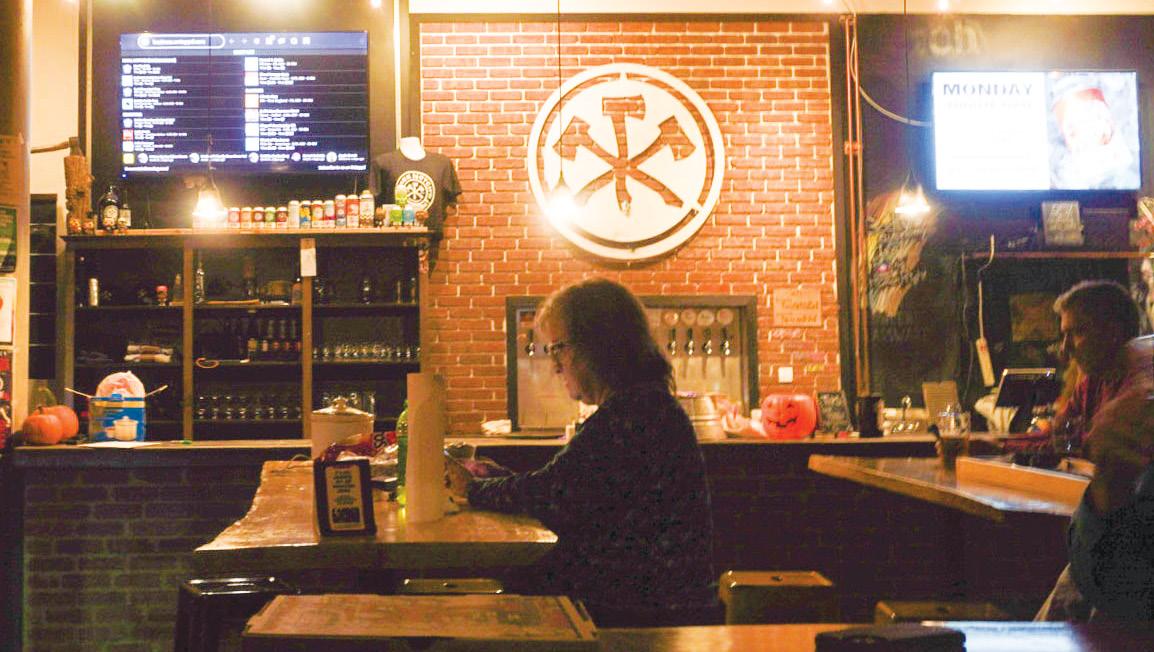
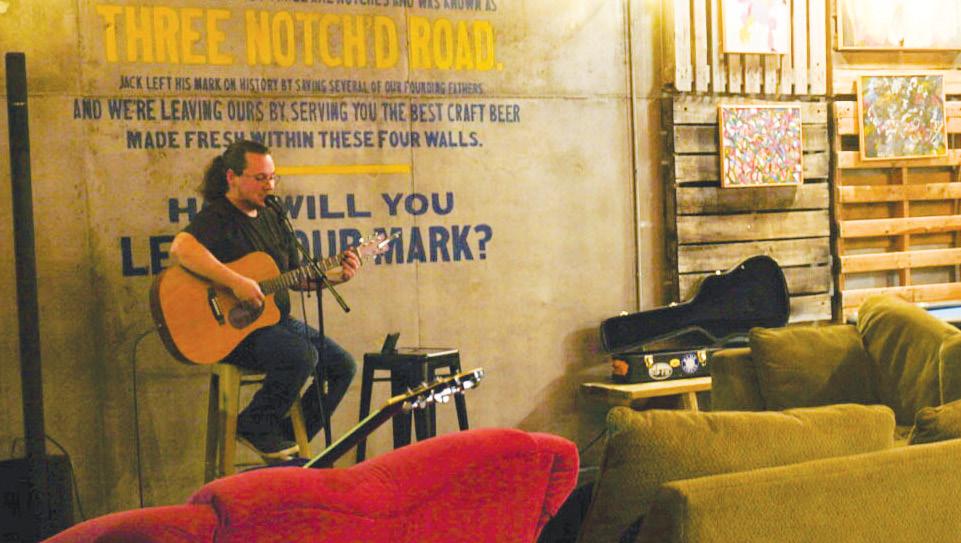
Local support
Though the sun set on the Shenandoah Valley, the Three Notch’d Valley Collab House was emblazoned with regulars in return for the brewery’s recurring Tuesday open mic night.
“[Anyone] old enough to get up here without hurting anyone,” Nick Branson (’17), the head brewer at Three Notch’d Harrisonburg, said when speaking of potential event participants.
Branson was a performer and emcee for the evening and has prior experience in the professional music industry as a singer and a voice teacher. Branson said his talents sparked the idea for an open mic night at Three Notch’d, which he proposed to his tap manager.
The overall initiative behind starting the event was to “liven up the place [on] the weeknights,” Branson said. When Branson performed his setlist, the acoustic plucking mixed with the conversations of customers created a dynamic atmosphere.
While few newer customers have yet to attend the event, regulars of Three Notch’d have started to visit more consistently on Tuesday nights, Branson said.
“We’ve definitely picked up new business either way,” Branson said, “but I think it’s more from retaining people who are already customers and … bringing those people back.”
Despite picking up a small mix of university students and downtown traffic, Harrisonburg
locals provide the most business at the brewery and “put butts in seats more often,” Branson said.
College town community
Jeff Steger, an open mic performer and former area bartender, is from the Valley and contributes to the “townie” crowd. The guitarist first stumbled upon Three Notch’d while searching for a nearby store.
“I ended up here [to ask] for directions and they didn’t know either,” Steger said, “so I thought I’d stick around for a while.”
Steger said the open mic event was what brought him back to the brewery. Though he recently has stayed away from performing, Steger keeps in practice to play for his grandmother.
“I entertain her for half the week,” Steger said of his “bedridden” grandmother. “Music [is] about the only thing that soothes her half the time. Better than other stuff, like beer.”
Steger attested to the Three Notch’d selection being “probably the best” in the area.
As pints were filled throughout the sonic current of the evening, it appeared most locals concur with Steger’s review. The Harrisonburg community as a whole, however, has been contributing to the sale of alcohol, Branson said.
“I think this town just has a way of supporting the alcohol industry,” Branson said. “It’s the damnedest thing how a college town can do that.”
Dedicated to the Dukes
On Sept. 24, the brewery hosted college town residents for the live viewing of the James Madison vs. Appalachian State football game.
Branson said the brewery plans to stream all football games the Dukes participate in outside of Harrisonburg on their new TV. During said games, the couch section of the brewery becomes the “watching football corner,” Brewer said. In part with this streaming, the Harrisonburg location also has plans to bring back the “Duke of Clouds” beer for future games.
The Three Notch’d company also features a “King of Clouds” and “Emperor of Clouds” beer with a higher alcohol by volume percentage, though, coincidentally, the “Duke” is exclusive to Harrisonburg.
“There’s a lot of potential for anything called ‘Duke,’” Branson said.
Uniquely-designed can labels will encase the beer for the fall sport supporters. Brewer also said the labels may display JMU purple and gold for the preexisting recipe.
“They’re going to be kind of a collector’s item,” Branson said. “They’ll probably change each football season.”
The brewery would be happy to have as many James Madison patrons as possible, Brewer said.
“I went to JMU, the manager went to JMU, so we’re all about it,” he said.
More events
Streaming football games, however, isn’t the only form of support Three Notch’d extends to the university. On Monday nights, the location hosts a jazz night event, which has featured a JMU jazz band.
“We’ll keep the doors open, let them play as long as they want,” Brewer said. “Music majors will come in and after a certain point, we’ll kind of rotate around instruments.”
In tune with the university’s musical attributions, JMUke, a ukulele based community project, hosted a jam session at the Harrisonburg location on Sept. 21. Branson said the club will bring in smaller, practice ukuleles and teach participants over the course of the evening, and participants will learn how to play a song on their new instruments before closing time.
In addition to music-centered event nights, the Three Notch’d brewery features “First Tap Fridays,” in which the brewery debuts a new beer at the start of every weekend.
Friday nights have drawn in the largest crowds of patrons compared to other weeknights, Branson said. Branson also said the event’s paired on most occasions with a local band.
Furthermore, the brewery is a big proponent for MACROCK, a DIY music festival hosted annually in Harrisonburg. Three Notch’d has often hosted ticket sales for the festival, leading to an influx of business from Macrock participants.
What’s next
Looking ahead for Three Notch’d Harrisonburg, the brewery will host a charity event on Nov. 4 with proceeds going to prostate cancer research and relief.
In part with the “No-Shave November” ideology, Branson plans to release a series of beverages called “Beerds” to raise awareness.
“Since I can’t really grow one, I figured I would brew one,” Branson said. The event will also feature a chef premiering her new cookbook and a set from the local band Bloo Lagoon. Festivities will occur from the brewery’s opening at 3 p.m. to closing at 10 p.m.
Beginning weekly on Wednesdays, is board game night at the Harrisonburg location. Chess, Risk, Catan and Lord of the Rings Risk are just a few of the games featured, Brewer said.
Events, such as those that recur throughout the week, are “a good way to remind people that we are still a local brewery,” Branson said.
“Sometimes, we kind of blend in with Three Notch’d at large and people are like, ‘Oh it’s just a big corporate … We don’t want to go there,’” Branson said.
Though beer enjoyers may have these assumptions about the valley location, both employees and management can attest to the community aspect of the location.
“We’re still local,” Brewer said. “I think today, customers want a safe, comfortable environment. They want good beer.”
CONTACT Evan Moody at moodyte@ dukes.jmu.edu. For more on the culture, arts and lifestyle of the JMU and Harrisonburg communities, follow the culture desk on Twitter and Instagram @Breeze_Culture.
Housing dilemma
Students compare experiences with off-campus apartments and houses to provide insight
By ANDREW KWAK contributing writerWith thousands of incoming students admitted to JMU every year, it may be overwhelming for students to get adjusted to their new campus lives. To add even more to their plate, before the end of the first semester, many freshman students ponder whether to continue their college careers living on campus or off campus. With the variety of options and living standards, it can be a lot to juggle if students are trying to piece this together on their own for the first time.
Various online resources for upperclassman housing exist on the JMU website, and the Housing Fair that will take place on Wednesday Oct. 19 from 11 a.m. to 2 p.m. in the Festival Grand Ballroom will host representatives from various local student housing options to directly help students learn about different off-campus living arrangements. Living off campus can be a fun experience, but it can be intimidating as a new form of independence, especially when weighing the benefits and costs between apartments and houses.
The housing experience
Stuart Brunk, a senior nursing major, transitioned into living in a house with people he knew from Campus Ministry after his freshman year.
Brunk said he’d paid over $5,000 to live in Shorts Hall during his freshman year, while his house on Virginia Avenue costs him $160 every month with an additional $50-$60 for utilities. For Brunk, the biggest improvement since moving to a house was the bigger and cleaner space where he could host large get-togethers, he said. He also said he felt closer to his roommates than those in his dorm as he knew his housemates beforehand.
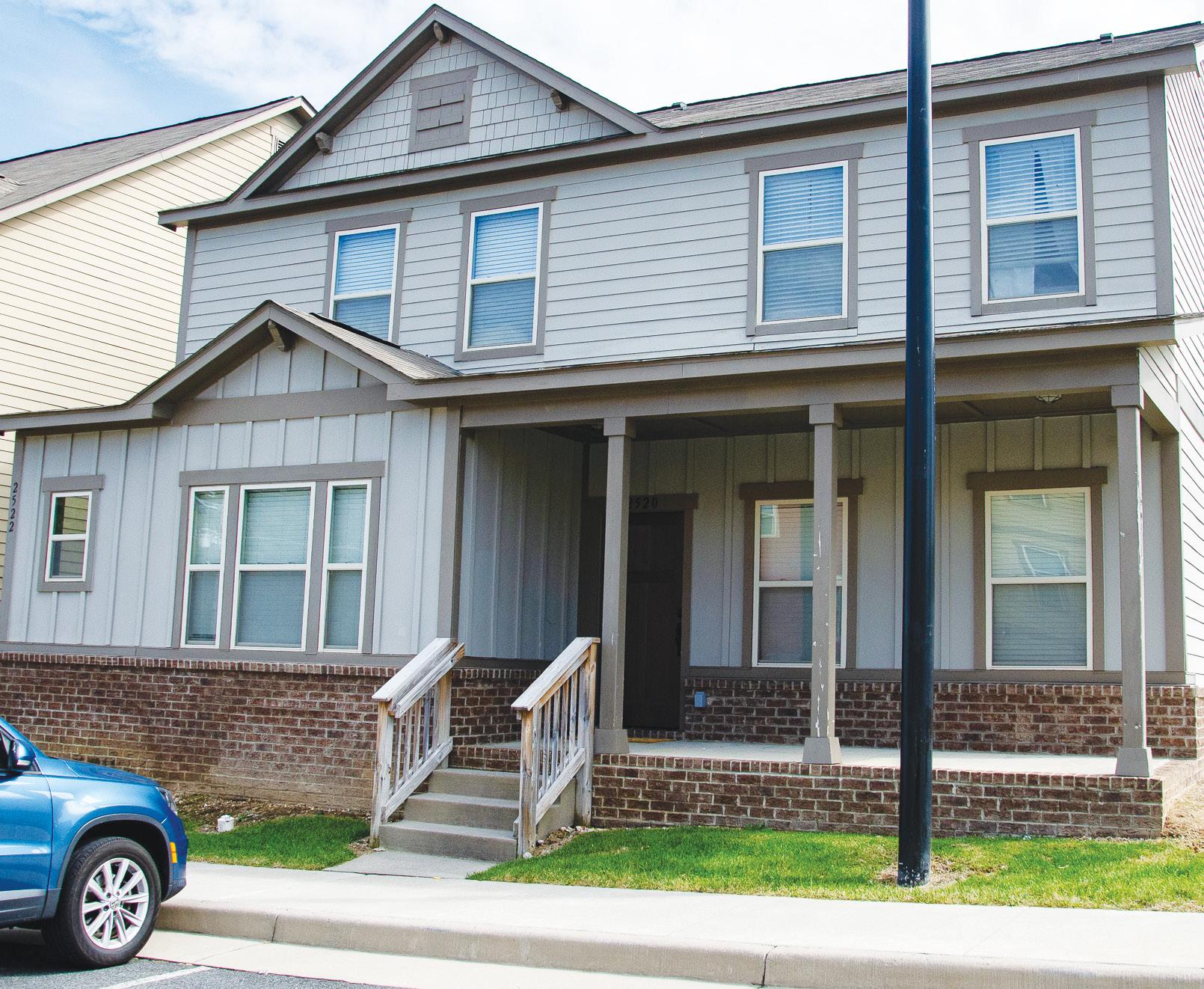
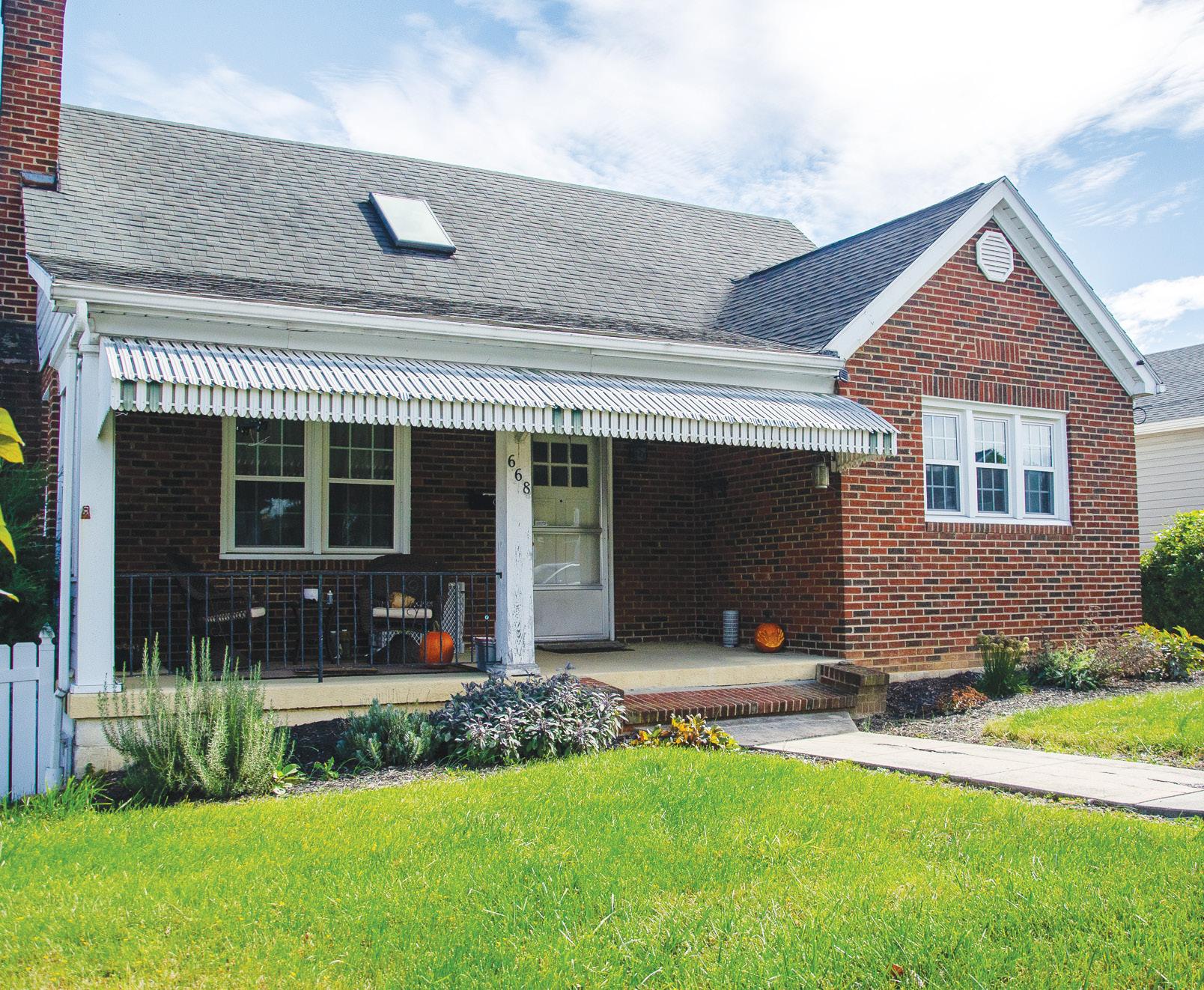
Furthermore, Brunk said he takes advantage of the kitchen, as he enjoys cooking for himself since he was only limited to a meal plan during his freshman year. Brunk also said he loves the community and that his landlord communicated well with him and his roommates and takes care of any problems that come up.
Brunk said he plans on staying where he is until he graduates since he doesn’t have any complaints and can’t find an alternative with better living standards for such a cheap price.
Addison Meadows, a senior religion major, has lived in both an
off-campus house and an apartment. She said she started her offcampus life with people she knew from Catholic Campus Ministry in a house located on North High Street with eight people for $500 a month, and then moved to a different house located on Main Street with 10 people for $435 a month, with rent at both places including utilities.
“You can host a lot of events and the whole place felt homier,” Meadows said.
Some events she and her roommates would host were Super Bowl and Christmas parties. She said her home was a place where people could regularly stop by and hang out. In addition, the location of the houses was perfect because they were downtown where there are always things to do. Being only a five-minute walk to campus also helped her save money on purchasing a parking pass that costs $150 per semester or $300 for the year.
However, it wasn’t all peaches and cream in a house with that many people.
Meadows said at both houses, everyone had to share two bathrooms and the line for the bathroom in the morning would back up her schedule. Furthermore, everyone had their own living standards and level of hygiene. Meadows said she felt some of the house rules, such as keeping the kitchen perfectly spotless, were strict and made her feel as though she was living back at her parents' home.
One of the hardest things, Meadows said, was when moving out of her second Main Street house, six of her roommates moved out, leaving only four of them to clean up any leftover mess to make it suitable for incoming residents.
Neither of the two houses had central heating nor air conditioning, with only the bedrooms having some form of heating and cooling. The residents were also financially responsible for all house maintenance which can become stressful when everything’s paid for out of pocket.
The apartment experience
As a senior, Meadows said she decided to move to Redpoint Apartments since a friend of hers was looking for a fourth roommate.
Meadows said she was most excited about having a central heating and cooling unit, her own bathroom and a fully furnished space.
“It was like living in luxury,” Meadows said.
Although it’s more expensive — with rent being $700 a month — Meadows said she didn’t mind the price tag for her last year.
Various amenities came with her new place, such as a clubhouse, tanning beds, printers, a study lounge and a gym.
While her previous houses were cramped with many people, Meadows only has three other roommates now. She noted there was more freedom in making decisions since there were only four of them and she got along with her new apartment roommates just as well as she did with her housemates.
Another perk that came with the apartment, Meadows said, was that she didn’t have to deal with a landlord. Instead, the flexible apartment management made it easy to communicate with one another. She said she also didn’t have to worry about parking since there was an abundance of open parking spaces surrounding the apartment. Work orders in the apartment were resolved punctually, whereas it would’ve taken a few months when she lived in a house.
Emily Perry (’19) lived on campus in Chesapeake Hall her freshman year and the Grace Street Apartments for her sophomore year.
At the time, the Grace Street Apartments were newly built, which was nice, Perry said; however, “the fire alarm was sensitive and the fire department would be coming in once a week,” which was the only gripe she said she had living there.
Wanting her own room, since she'd shared a bedroom until sophomore year, Perry said she decided to move off campus during her junior year where she paid monthly rent of $545, including utilities, with a separate parking fee. Similar to Grace Street, Perry shared a bathroom with one other roommate but had her own room.
You’re on your own with no rules, [I] didn’t have to worry about RAs and I could have as many people over due to the big space,” Perry said. It also came with amenities such as a clubhouse with printers and computers, a small gym and a pool.
“When we first moved in, it was nasty and gross, with maintenance not being that great,” Perry said. This wasn’t the only negative thing that came with living in student housing.
Perry said she came home one day and a portion of the ceiling between the kitchen and living room collapsed. Water was pouring out due to leaky pipes from the dishwasher in the unit
above theirs. Perry said their apartment’s management wasn’t communicative and only gave a temporary fix and left it as it was for months until Perry and her roommates had to address it themselves because she said it seemed management had forgotten about the whole ordeal.
“Even after winter break, they still hadn’t permanently fixed the ceiling when we all came back from the holidays,” Perry said.
Perry said she decided to move out when the rest of her roommates had graduated and she didn’t want to room with randomly selected people. Instead, she and her boyfriend, who had recently returned from South Korea, decided to move in together at the 865 East Apartments.

They moved into a one-bedroom and onebathroom apartment with a monthly rent of $800 with an additional charge of $50-$70 for electrical utilities. The biggest reason they decided to live at the 865, Perry said, was because it was one of the closest one-bedroom apartments to campus.
“It was worth living there even though it’s more expensive,” Perry said.
Perry said she never needed maintenance as the quality of the place reflected upon the price of the apartment.
Some benefits of the 865 were that the staff and manager were very “amicable” and created close relationships with all of the tenants, Perry said. In addition to a built-in gym in the apartment, there were also various restaurants on the first floor of the apartment building. All in all, Perry said she had no complaints staying at the 865.
Recommended Route
There are countless options for student living in Harrisonburg , and choosing one may be overwhelming.

“I know that people want to move off campus to have more freedom, but I would advise [living] on campus since I had a good experience,” Perry said. “Before moving out, listen to stories from upperclassmen, read reviews; I saw a video where some girls opened their utility closet and it was filled with mold. Join Facebook groups
and read if the maintenance is good or bad since anything can go wrong.”
There are Facebook groups where students post about their off-campus experiences as well as those that have open leases for any student interested in off-campus living.
Speaking from personal experience living off campus, Brunk strongly suggests it for other students.
“Immediately move out into a house with close friends,” Brunk said. “Living off-campus grants you so much freedom.”
Meadows also said she recommends “to wait to move out [of off-campus living], until you find a set friend group by junior or senior year,” especially if you lean toward a house lifestyle, as it involves more responsibilities. In addition, she said she thinks an apartment during sophomore year would be a good choice, as things are more laid out for convenience.
The two main points in deciding what sort of environment to reside in come down to how many responsibilities and how much independence you want to have.
Overall, when deciding whether an apartment or house is cheaper to live in, it ultimately comes down to what you want to have in a living space. A house may be cheaper if rent is being spilt among more people than it would be in an apartment.
However, students are more responsible to pay for things like maintenance repairs and utilities out of pocket while living in a house. Houses provide more overall square footage, but usually come with the cost of losing out on personal space like your own bathroom. Amenities like a pool, gym and free printing are also something to keep in mind as well as how many people one prefers to live with.
“Living with more people you know makes coming home more fun,” Meadows said. “[I’m] always looking forward to it.”
CONTACT
Andrew Kwak at kwakas@ dukes.jmu.edu.
For more on the culture, arts and lifestyle of the JMU and Harrisonburg communities, follow the culture desk on Twitter and Instagram @Breeze_Culture.
'Unsung hero'
Fifth-year backup linebacker
garners respect in locker room through maturation, mentorship
By GRANT JOHNSON The BreezeMateo Jackson has contributed in spurts in his five years at JMU. He’s battled injuries. He was thrown into the fire early, only to wait his turn later on.
He stars on special teams. He’s mature, commands the locker room and now leads a cohort of linebackers he once learned from.
But he does so primarily from the sideline.
“It's kind of weird because I've always kind of had somebody older than me,” Jackson said. “Everyone's just looking at me now for answers.”
Jackson, a redshirt senior, backs up redshirt sophomore Taurus Jones and sophomore Jailin Walker at the second level of a JMU defense that’s first in the FBS by a wide margin in multiple run defense statistics. Walker and Jones, through four weeks, have racked up 51 combined tackles — 22% of the team’s total — and forced a turnover in all but one game. Officially on the two-deep depth chart ahead of this week’s Arkansas State game, Jackson is behind Jones at the MIKE, or middle, linebacker position.
Off the field, though, Jones and Walker defer to Jackson.
“Me and Jailin, we’re getting a lot of coverage right now, but ’Teo, he's really the unsung hero,” Jones said. “In the film room, and being on the sideline, he just tells us things to look out for.”
Jackson found his way onto the field when JMU’s been on defense the last two weeks, but not at the expense of Jones' or Walker’s playing time. The Dukes began deploying a 4-3 defense against certain run-heavy personnel packages versus Appalachian State.
The package worked. App State gained 93 yards on the ground compared to JMU’s 223.3 average in the Mountaineers’ three games beforehand. Jackson took advantage — he matched a career high in tackles with five. Jones said there’s no letdown in the linebacker corps’ level of play when Jackson’s in the game.
The playing time’s not new. Jackson said JMU sported a similar defense last year for some of the FCS semifinals versus North Dakota State.
But it started even earlier than that.
“I came in my freshman year, and I had to come in and fight right away and kind of play early,” Jackson said. “That kind of, I would say, speeded up my growth a little bit to where I'm at now.”
But what’s different for Jackson in 2022 is he no longer has Diamonte Tucker-Dorsey (2017-21), Kelvin Azanama (2016-21), Landan Word (2017-19) or Dimitri Holloway (2015-19) in the linebacking room to lean on. It’s different, Jackson said, but he’s trying to embrace the opportunity.
“It's kind of like something that you kind of worked for, to have everybody come to you asking you questions,” Jackson said. “My time is here.”
Jackson has appeared in 44 games and is four games into his fifth year, accumulating 66 career tackles. But most of his playing time has come on special teams, where he starts at guard on the punt team. Redshirt senior tight end Drew Painter — who plays the “punisher” position on JMU’s punt team — said the two command the unit.
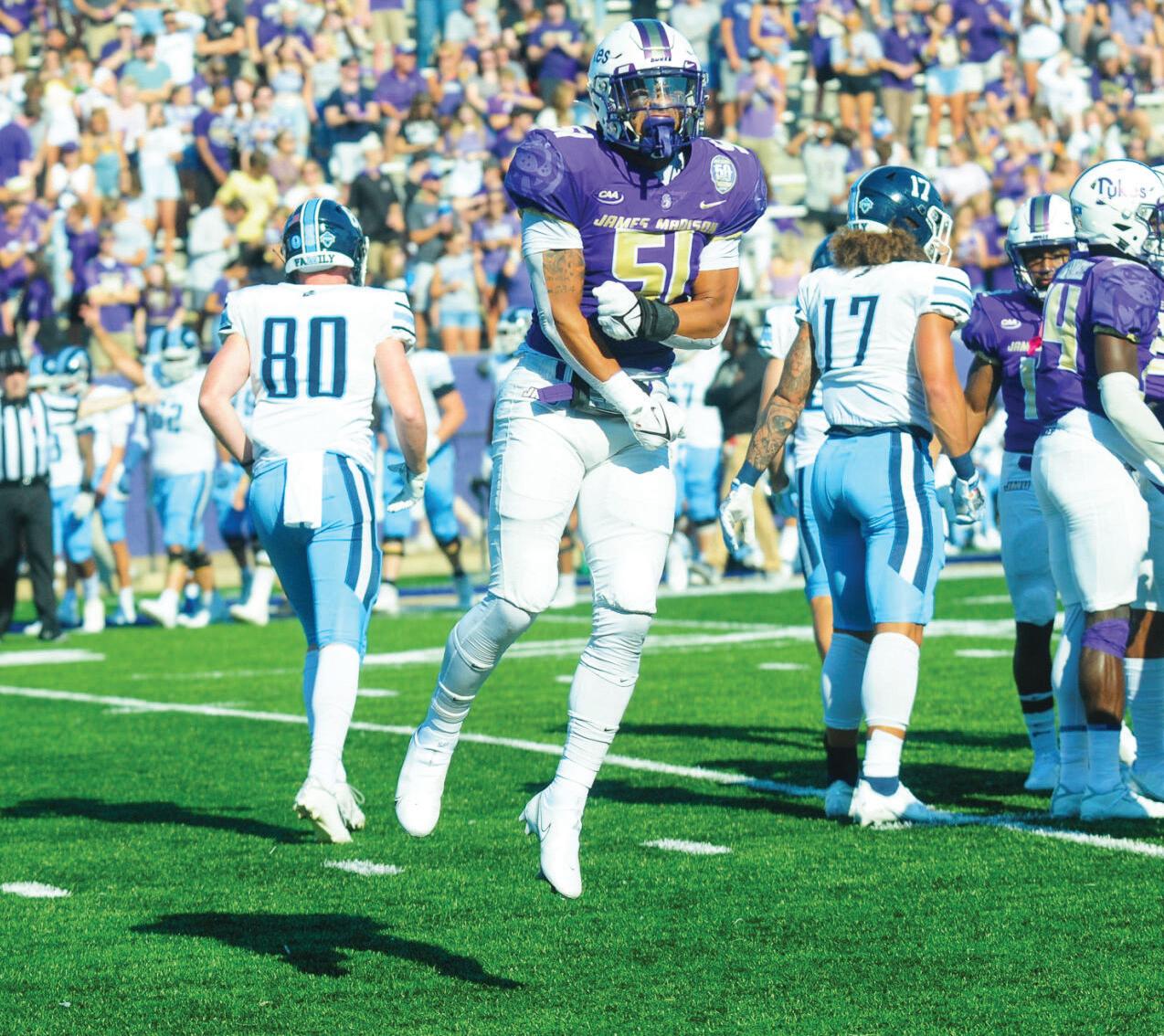
“Whenever he gets on the field, he's got that bulldog mentality,” Painter said. “He's always gonna hit hard; he's always gonna fly around, fly to the ball. You know, he's really blossomed throughout the years.”
It’s these qualities that JMU head coach Curt Cignetti said makes Jackson a popular player in the locker room who teammates respect. Redshirt junior running back Latrele Palmer said a lot of guys — not just on the defense — listen and look up to him.
Cignetti said he spends most of his time with the offense at practice, so he doesn’t always have an ear on the defense. But when he listened back to the Texas State postgame press conference and heard Walker and Jones sing Jackson’s praises, he said he wasn’t surprised.
“I've really seen him mature through the years, and he's really a smart football player that gives great effort, loves playing the game,” Cignetti said. “I think when guys see that on the field and a guy represents himself a certain way, you know, the younger guys tend to gravitate toward a guy like that.”
He may not have the production of the linebackers who defined JMU’s latter FCS days, or Walker and Jones’ barring injury. But what he does have is a prominent voice on the team.
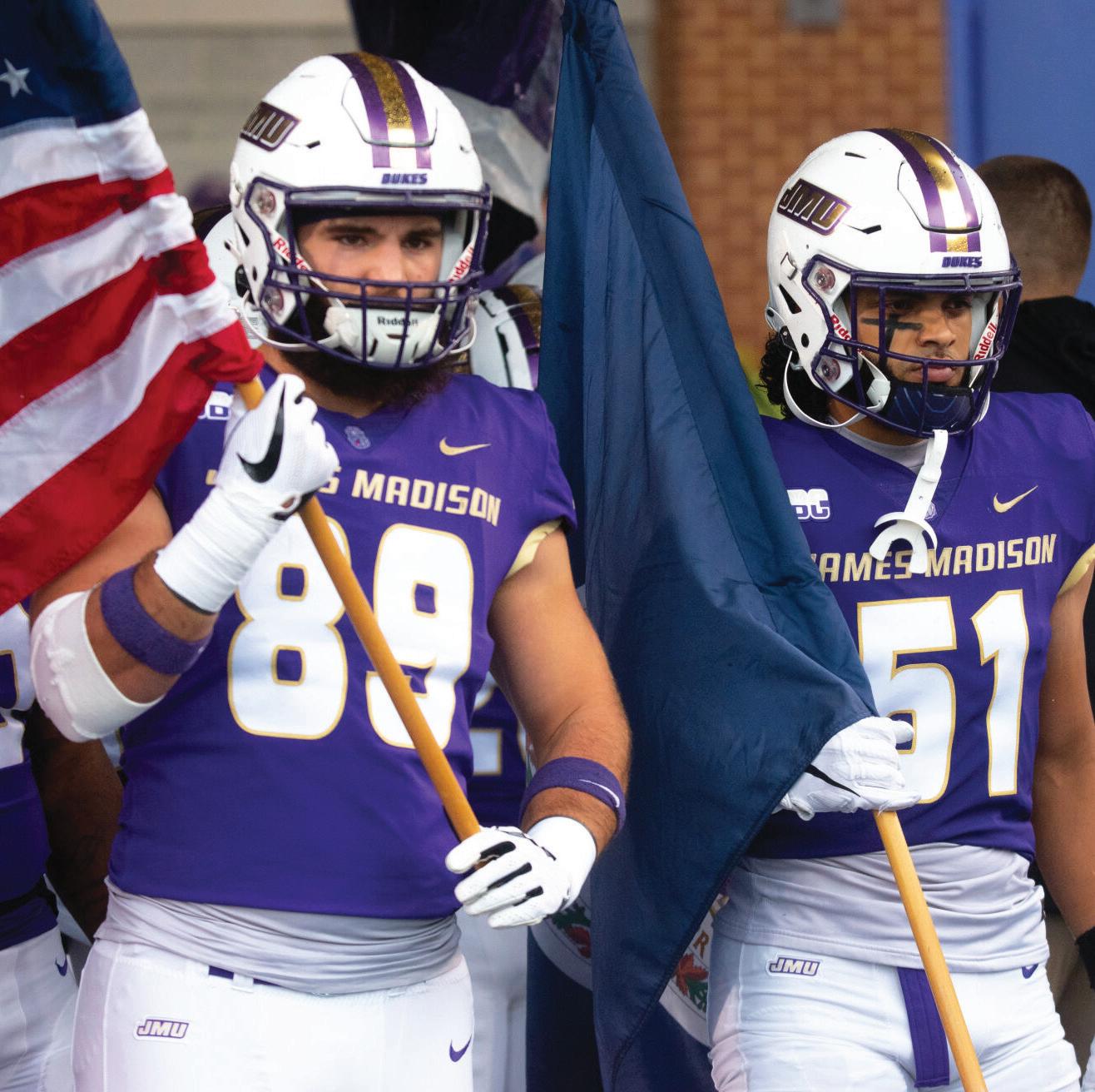
Jackson’s content with that.
“It's a long journey,” Jackson said. “I'm just happy to be here — happy to be part of this historic season and just keep everything rolling for JMU.”
CONTACT Grant Johnson at breezesports@ gmail.com. For more football coverage, follow the sports desk on Twitter @TheBreezeSports.

Shared court
JMU men’s tennis adds a father-son duo for 2022-23 season
By CRAIG MATHIAS The BreezeAfter 30 years as the head coach of JMU men’s tennis, Steve Secord now has a player unlike any other on the team — his son.
Graduate Canon Secord, after playing four years at nearby Bridgewater College, is using his fifth year of eligibility to play under his father at JMU. While this wasn’t planned, the stars aligned for Canon to join the Dukes.
After graduating from Bridgewater, Canon entered the transfer portal — planning to use his final year of eligibility somewhere else. He’s coming off four straight VaSID First Team All-State honors and being named as VaSID Player of the Year in 2019 and ’22.
While schools started to show interest, Canon said everything changed one night during a conversation with his dad.
They discussed JMU as a real possibility. Canon looked into JMU’s graduate cyber intelligence program. The rest is history.
“We saw JMU had some interest,” Canon said. “We thought it would be good if I pushed myself to the next level and see where it could take me.”
Growing up in Harrisonburg and with both parents being JMU graduates — including his dad serving as head coach since 1992 — Canon has been around the school his whole life. He grew up going to JMU football games before attending Bridgewater.
Having now spent some time as part of the same team, Canon joining the Dukes has been great for everyone involved, including his wife, Diane, Steve said. Steve makes sure Canon keeps up with both onand off-court training, and Diane checks
on their son when he gets home.
“It’s been different now,” Steve said. “I go home and my wife asks how Canon is, so that’s been cool. Being able to be on court and traveling with him, it’s been pretty cool.”
Canon has picked up doubles wins at both tournaments so far this fall with his partner, sophomore Edson Sanchez, and a singles win at the Elon Fall Invitational. But to freshman Aathreya Mahesh, Canon has contributed even more in helping new guys like himself get acquainted with life at JMU.
In his first semester with the Dukes, Mahesh said Canon’s been helpful with getting adjusted to college life both on and off the court. Connecting both at practice and on road trips has been a catalyst of why Mahesh said he enjoys JMU so far.
“I go to him with any questions I have,” Mahesh said.
“He knows a lot since he’s been here … He’s been a great teammate so far. We’re going to have a good season with him and I’m excited.”
Canon and the Dukes return to the court Oct. 7-9 for the River City Tennis Open hosted by the University of Richmond, followed by the ITA Atlantic Regional Championship in Charlottesville, Virginia, Oct. 19-24. Their fall schedule concludes Nov. 4-6 at the Wake Forest Fall Invitational.
Going forward, now back at the campus he grew up around, Canon said he’s going to enjoy every part of the experience and use this special connection to not just his, but the entire team’s advantage. He said he and his dad work well together because they know each other’s strengths and weaknesses.
But describing it all? Canon said he couldn’t.
“It’s very hard to put it into words,” Canon said. “Not many people get to experience what this is like.”
CONTACT Craig Mathias at mathiack@ dukes.jmu.edu. For more men’s tennis coverage, follow the sports desk on Twitter @TheBreezeSports.


Thoughts before JMU vs. Arkansas State
By JACKSON HEPHNER The BreezeCoach's Corner: Control the controllables
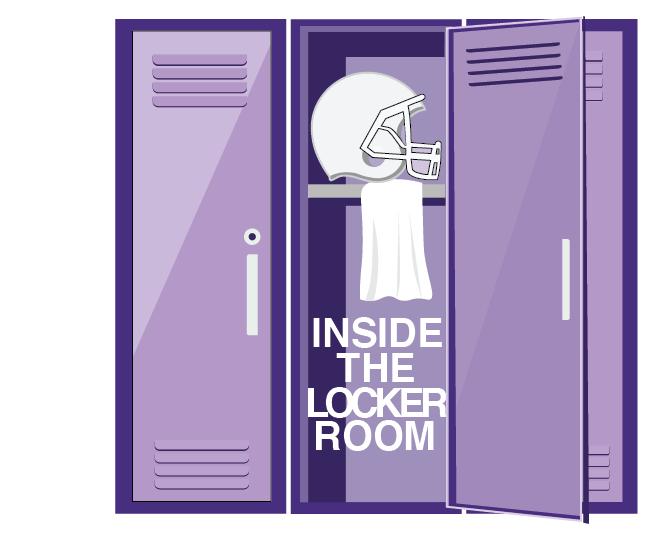
Quick Hits
- Head coach Curt Cignetti said having no penalties against Texas State was a positive, but the Dukes still haven’t played their best game yet.
- Cignetti said pre-snap penalties are a big focus in practice after struggling with them in the team’s first road trip against App State.
Players' Perspective: Keep fighting Quick Hits
- Redshirt senior tight end Drew Painter said the Dukes need to continue the same mentality they’ve had throughout the first four games while on the road this week.
- Redshirt senior linebacker Mateo Jackson said being in a leadership position for the other linebackers has helped keep his teammates constantly improving.
Read the full story at breezejmu.org.
1 p.m.
Volleyball vs. Old Dominion
7 p.m.
Football at Arkansas State
7 p.m.
Men’s soccer vs. Gardner-Webb
Sunday, October 9
All Day
Men’s tennis at River City Tennis Open
Thursday, October 6
8 p.m.
Women’s soccer at Texas State
Friday, October 7
All Day
Men’s tennis at River City Tennis Open
All Day
Women’s tennis at Martha Thorn Invitational
6 p.m.
Volleyball vs. Old Dominion
Saturday, October 8
All Day
Men’s tennis at River City Tennis Open
All Day
Women’s tennis at Martha Thorn Invitational
All Day
Swim & Dive at George Washington
All Day
Women’s tennis at Martha Thorn Invitational
11 a.m.
Field hockey vs. Iowa (neutral site)
12 p.m.
Women’s soccer vs. South Alabama
Monday, October 10
All Day
Women’s golf at Dale McNamara Invitational
Tuesday, October 11
All Day
Women’s golf at Dale McNamara Invitational
2 p.m.
Men’s soccer at American
Wednesday, October 12
Whatcha thinking?
JMU fans share changing expectations after 4-0 start
By MADISON HRICIK The BreezeAfter jumping out to a 4-0 start and gaining national attention from college football outlets, JMU football fans’ original expectations for the 2022 season are drastically changing from what they thought.
The Breeze surveyed 80 fans’ opinions and how they’ve evolved since the start of the season. The full survey, including quotes from varying responses, are included online.


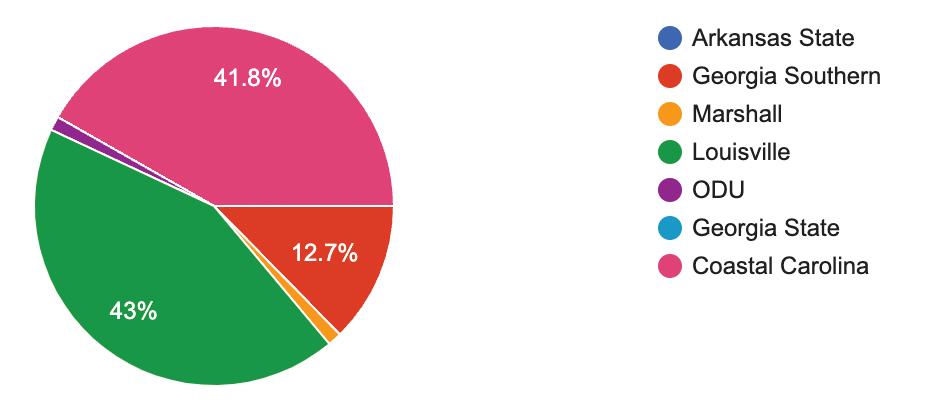
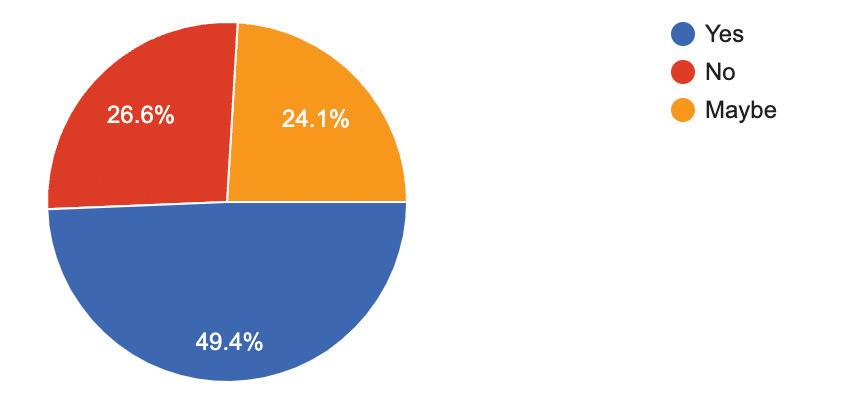
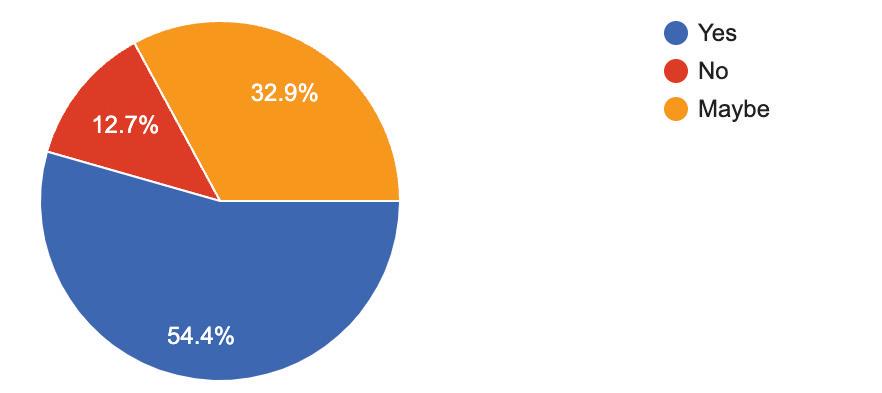
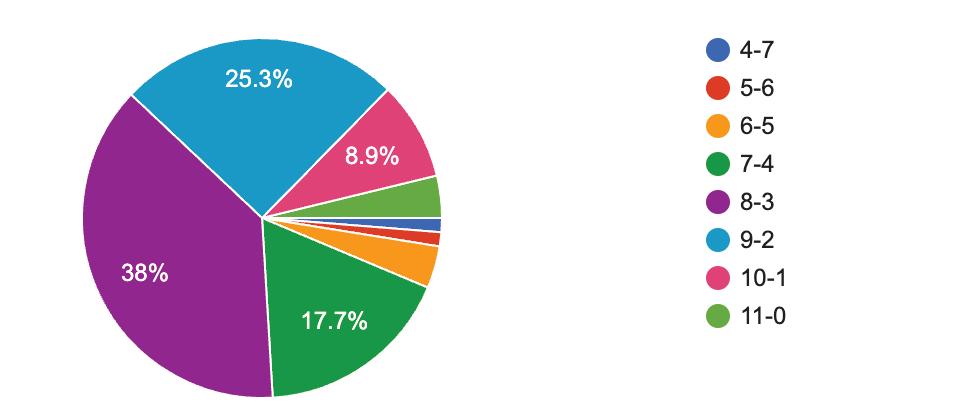
Read the full story at breezejmu.org. CONTACT Madison Hricik at breezesports@gmail.com. For more football coverage, follow the sports desk on Twitter @TheBreezeSports.
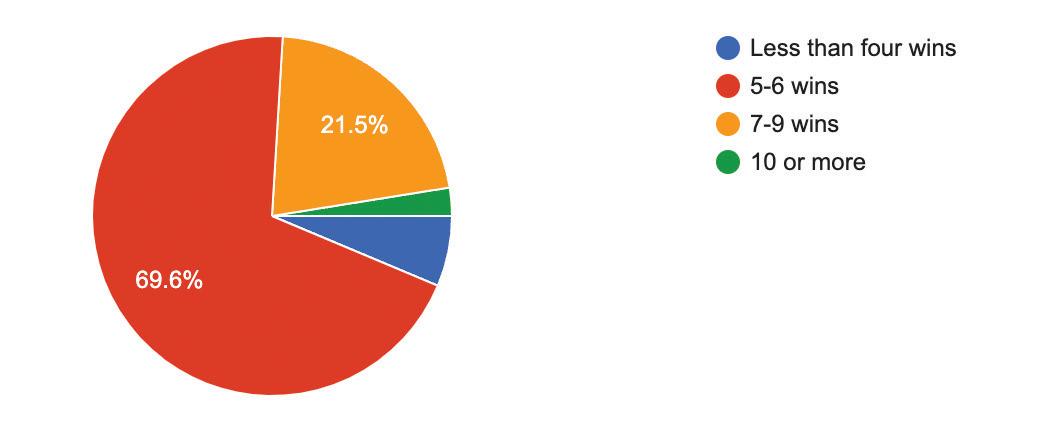
What was your original season predicition?
What’s your season prediction now?Do you think JMU will be ranked this season?
Will JMU have a chance to host ESPN College GameDay?
What’s JMU’s most difficult opponent left?
Which position has surprised you the most?
position still concerns you?


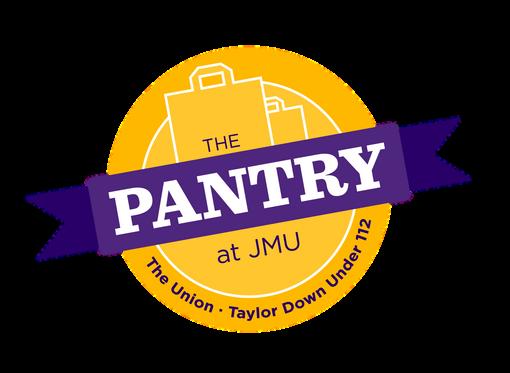





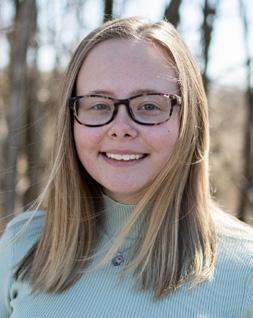
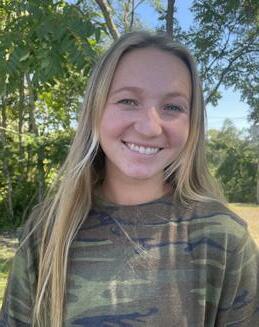
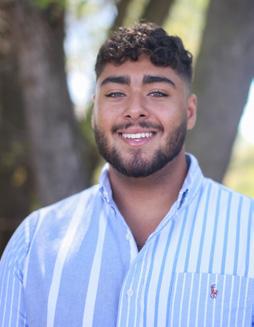
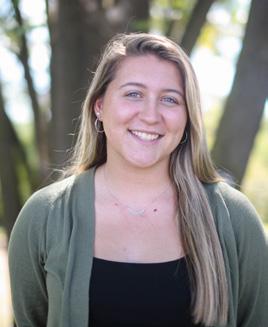
 By Prasanna Keshava
By Prasanna Keshava




MADISON MARKETPLACE
Customer Care Representative (Full-Time)
CITY OF HARRISONBURG JOBS JOBS COMMUNITY
Part-Time Job OpportunityCustomer Care Representative
Do you want to utilize your customer service skills/knowledge to help ensure that citizens and local businesses receive quality water and sewer services? If so, the City of Harrisonburg Public Utilities Department’s Customer Care Representative part-time position may be the right job for you! Find out more/apply online: https://www.harrisonburgva.gov/ employment. EOE.employment. EOE.

Job Opportunity - Water Service Technician
Do you want a part-time job that helps provide a meaningful service to the community through a variety of customer service activities? If so, the Public Utilities Department’s Water Service Technician may be the right job for you! Find out more/ apply online: https://www.harrisonburgva. gov/employment. EOE.
Career Opportunity - Sign Graphics Designer & Fabricator

Do you want a career that allows you to utilize your technical/creative skills and experience to design/manufacture a variety of signs for traffic control/City facilities? If so, the City’s Public Works Department’s Sign Graphics Designer & Fabricator role may be the right position for you! Find out more/apply: https://www.harrisonburgva. gov/employment. EOE.
Part-Time Job OpportunityRecreation Aide (Athletics)
Do you want to utilize your organizational skills, customer service skills, and passion for sports in a youth athletics league setting?
If so, the City of Harrisonburg Parks and Recreation Department’s Recreation Aide - Athletics may be the right job for you! Find out more/apply online: https://www. harrisonburgva.gov/employment. EOE.
Do you want to utilize your customer service skills/knowledge to help ensure that citizens and local businesses receive quality water and sewer services? If so, the City of Harrisonburg Public Utilities Department’s Customer Care Representative position may be the right career for you! Find out more/apply online: https://www.harrisonburgva.gov/ employment. EOE.
Career Opportunity - Deputy Building Official
Are you searching for your next career move with an organization that will support you through your professional growth?
If so, the City’s Deputy Building Official position may be the right opportunity for you if you have prior experience in codes enforcement or inspections work! Find out more/apply: https://www.harrisonburgva. gov/employment. EOE.
Career Opportunity - Technician
I - Athletic Field Maintenance
Are you seeking an opportunity that allows you to work in a mix of indoor/outdoor facilities while utilizing your knowledge/ skills/abilities related to athletic field maintenance? If so, the City’s Parks and Recreation Department’s Technician I-Athletic Field Maintenance position may be the right career for you! Find out more/apply: https://www.harrisonburgva. gov/employment. EOE.
Seasonal Job Opportunity - Golf Course Maintenance Laborer
Are you looking for a seasonal position in a friendly golf course environment while working on a variety of fall and winter projects at the course? If so, consider applying for the City of Harrisonburg’s seasonal Golf Course Maintenance Laborer position!
Find out more/apply online: https://www. harrisonburgva.gov/employment. EOE.
Paid Part-Time Project Coordinator/ Assistant Job Opportunity for Faces 4 Change Harrisonburg Drug Free Community Coalition


Interested in coordinating efforts to maintain drug-free communities and positive youth engagement? This is for you! Proficiency with Google/Microsoft Platforms, Zoom, and good communication skills. For more details, email us: faces4changeharrisonburg@gmail. com (faces4change.org). Upper classman/ grad/professor.
Career Opportunity - Athletic Field Turf Manager
Are you seeking a leadership opportunity that allows you to utilize your experience in the preparation of athletic fields and planning/overseeing/implementing field maintenance plans? If so, the City’s Parks and Recreation Department’s Athletic Field Turf Manager may be the right career move for you! Find out more/apply: https://www. harrisonburgva.gov/employment. EOE.
Water Service Technician (Full-Time)
Do you want a career that helps provide a meaningful service to the community through in-field customer response? If so, the Public Utilities Department’s Water Service Technician may be the right job for you! Find out more/apply online: https:// www.harrisonburgva.gov/employment. EOE.
911 Emergency Communicators
Do you want to be a First Responder? Do you want to have a direct impact in saving lives and serving our community? Have you ever thought about becoming a 911 Emergency Communicator? Consider applying with the Harrisonburg-Rockingham Emergency Communications Center (HRECC). Find out more/apply online: https://www. harrisonburgva.gov/employment. EOE.

After School Part Time Child Care
Great part time opportunity for dependable , responsible student to supervise and transport 10 &13 year old kids. Mon- Fri 3pm-6pm every other week. Good driving record, reliable transportation required . $15 hourly. Excellent references. Call or text 540-478-3336

Part time Home Health Aide
Part-Time Home Health Aide needed for myself near JMU campus! I am wheelchair bound due to Parkinson’s and need another part time nursing assistant to fill in during the week! Contact me at 540 271 0439 with serious inquiries only!
Parking
Looking for a parking space? I have spaces available on our farm. We’re located 1520 minutes north of JMU. Shuttle service available. For more information call Dennis @540-820-3838 .




